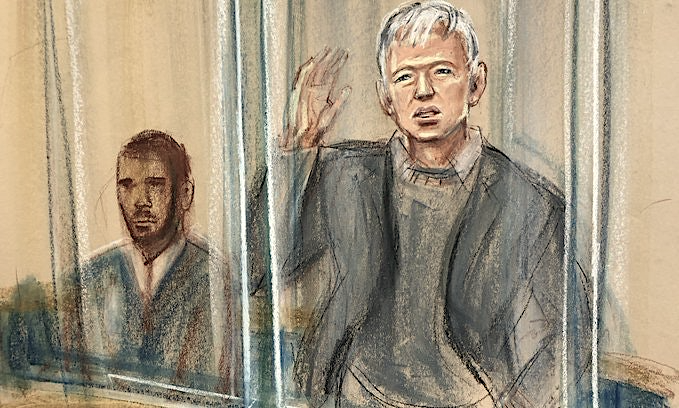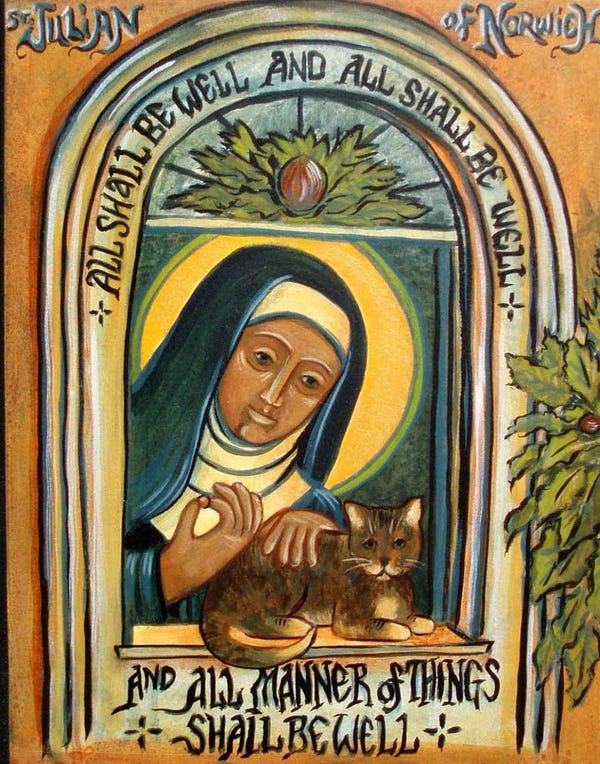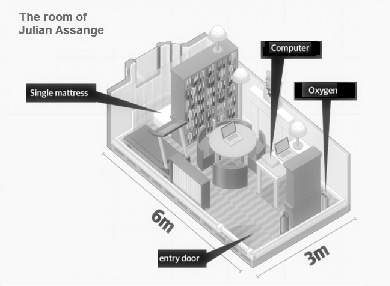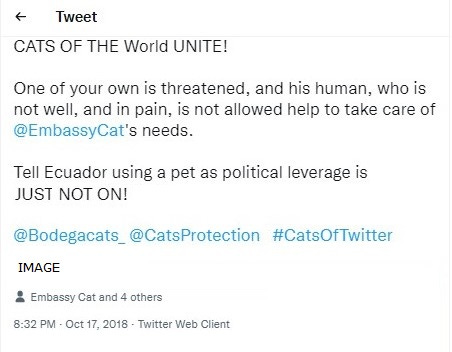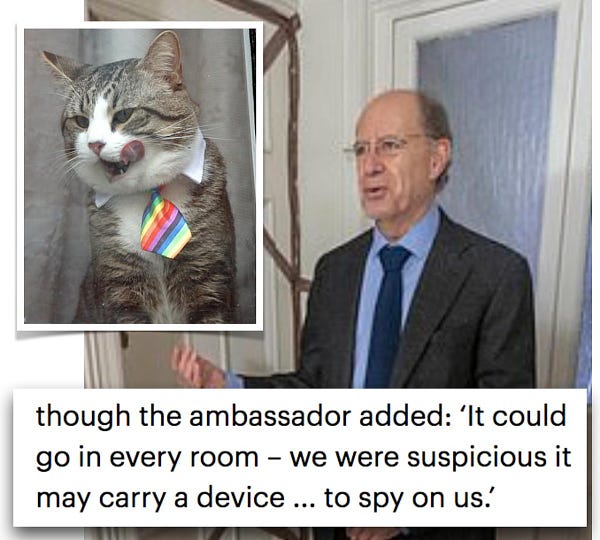– 700 years before Julian Assange spoke to us from behind the brick walls of a London embassy, Julian of Norwich spoke to us from her own bricked up cell. What do these two voices have in common?
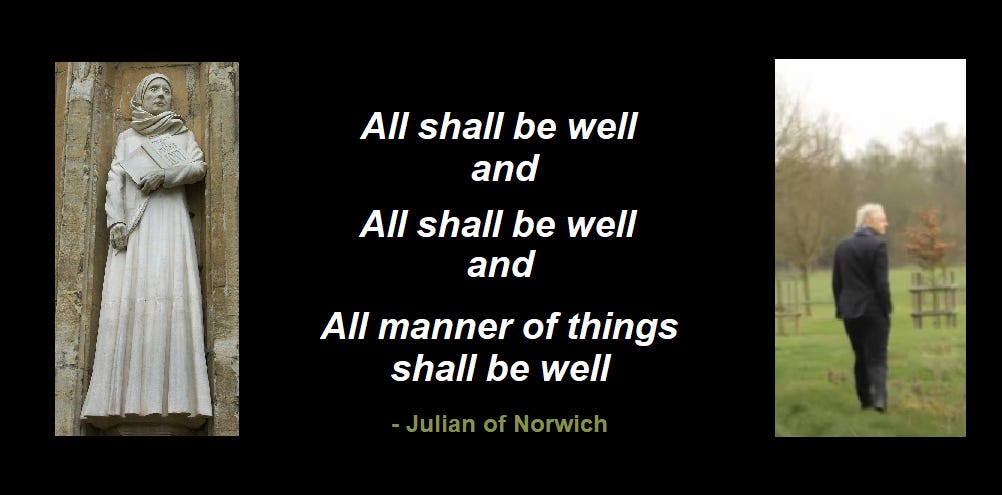
I first learned of Julian of Norwich in 2018, from Ciaron O’Reilly (an Australian with a long association with the Catholic Workers movement) when he appeared on several of the early #Unity4J online vigils for Julian Assange.
As well as having a long association with the antiwar movement and related Ploughshares actions (having spent time in the US prison system in this regard), O’Reilly was one of Assange’s many supporters who regularly gathered outside the walls of the London embassy in which Assange took refuge (on 19 June 2012).
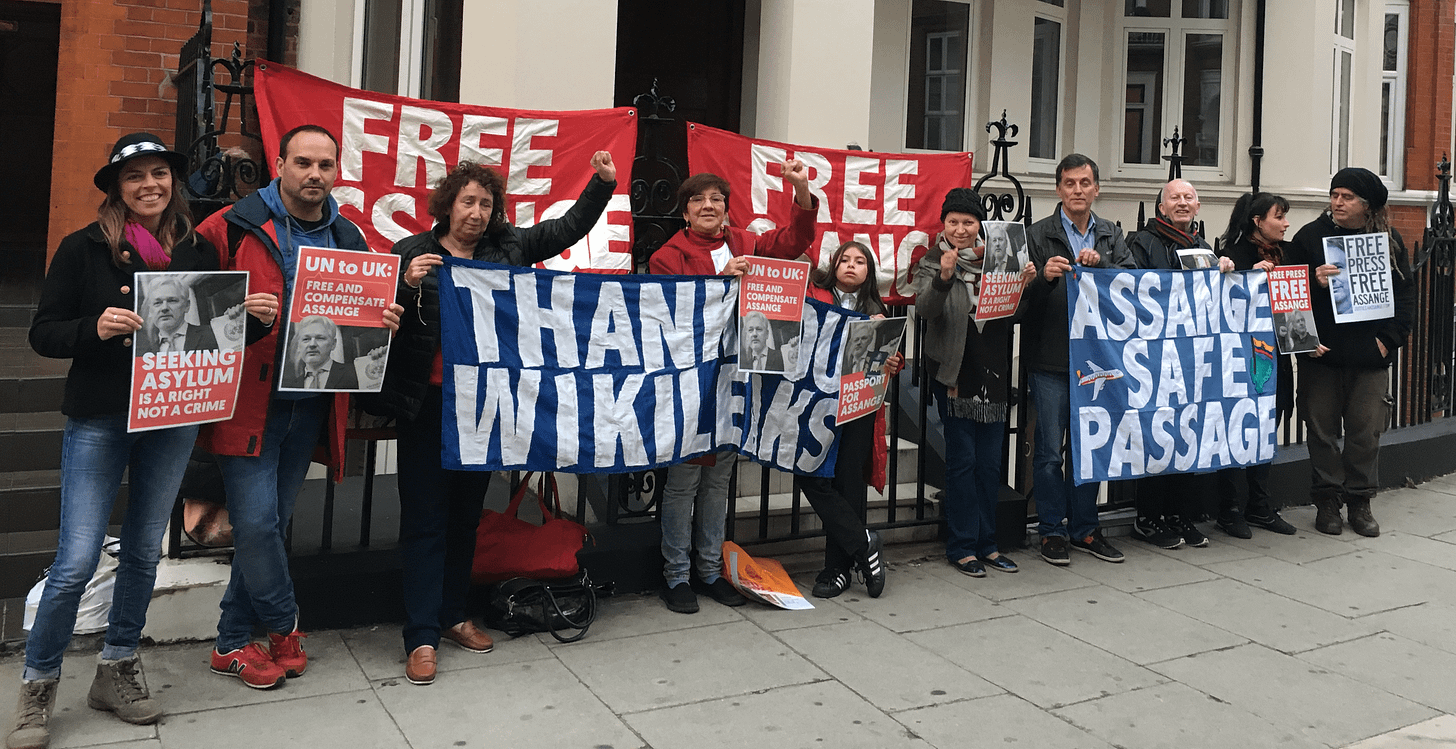
In 2018-19 he took on himself a special role of overnight “watcher outside the walls”, ever vigilant for the UK shock troops that might (and eventually did) break in to Julian’s seclusion.
To “vigil” is to stay awake while #British society slumbers to [the] ongoing slow motion crucifixion of #FreeJulian #FreeAssange A society where fellow journalists, academics & church leaders keep a house broken silence on ongoing persecution of a publisher who has published the truth.
– Ciaron O’Reilly in “The slow-motion crucifixion of Julian Assange“ (14 July 2019)
As it happens, O’Reilly was in Ireland on a brief respite from his ongoing vigil when the final outrage against international asylum law occurred, with UK police entering sovereign Ecuador territory and, with their collusion, arresting Assange and dragging him off to the infamous HMP Belmarsh (often referred to as Britain’s Guantánamo).
So it was the five day vigil, with camera at hand, of RT UK’s Barnaby Nerberka (11 April 2019) that bore witness, world-wide, to this brutal act of rendition.
Since 11 April 2019. when “he was kidnapped, judicially” (as half-brother Gabriel Shipton put it), Julian Assange has been involuntarily secluded, mostly in solitary confinement: “locked away in silence” behind those prison walls.
Lamentation in song
VIDEO: David Rovics sings “Behind These Prison Walls“ outside HMP Belmarsh, where Julian Assange is still held “locked away in silence“- on remand; not convicted of any crime. [YouTube]
NOTE: You might enjoy playing the song while you read on …
Making connections
Already part of the ongoing efforts of the Team Assange movement (at that time via #Unity4J), my interest in Julian of Norwich was sparked not only by what seemed to be a parallel between their lives of seclusion – him in asylum in his small room in Ecuador’s London embassy, and her in her bricked up cell at St Julian’s church – but also by the images of them both with their cats, and the way both have spoken to the world (in person and in the media of the day) about large issues from the small spaces they have occupied.
“Both have spoken to the world (in person and in the media of the day) about large issues from the small spaces they have occupied.”
Both are powerful voices from behind “the bricks in the wall” – so chillingly evoked in that most famous song of Pink Floyd’s Roger Waters, himself an outspoken supporter of Julian Assange.
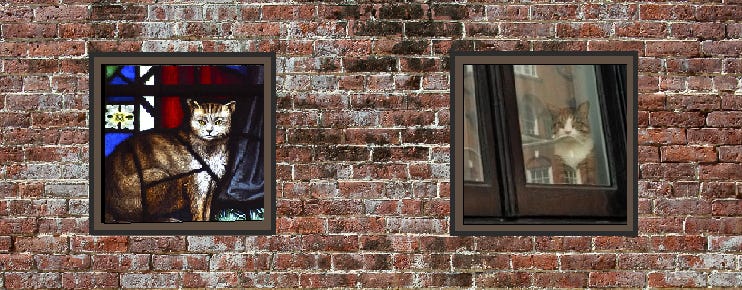
That I also live in a kind of seclusion myself, with my cat, yet try to use my own small voice (via the virtual window afforded by modern media) to shed light on the same issues, meant that their situations resonated strongly with me, and led me to consider whether there might be a relationship between the seclusion in which the two Julians have lived and the power of their voices to speak down through the ages – those past and those yet to come.
[Note: The web mistress of perhaps the most comprehensive online collection of information related to Julian of Norwich says “Copying Julian, this webmistress lives as a hermit in a graveyard, though in Florence rather than Norwich.“ Perhaps there are many more recluses toiling away in small spaces on resolving the large problems of the world than has yet been noticed.]
It was not until 2020, with the arrival of the coronavirus “pandemic“, that yet another parallel emerged. This may, in the long view of history, prove to be one of the most important.
Julian of Norwich (1343-1416+, possibly 1430)
Nearly 700 years ago, a girl child was born into an era of bubonic plague – with the “second pandemic” reaching her native England in June 1348.
Originating in Asia, it spread west along the trade routes across Europe and arrived in the British Isles from the English province of Gascony (in modern south-west France). Referred to at the time as “The Great Mortality”, and later termed the “Black Plague”, this was a bacterial plague, spread by infected fleas carried by rats.
[The “first pandemic”, the Plague of Justinian, is said to have been in the Byzantine Empire, in the 6th-8th centuries: Benedictow, Ole J (2004)]
In the first round of this second pandemic it is now estimated that 40–60 per cent of the population died. [This era is powerfully depicted in Ken Follet’s “World Without End” – the second book in his Kingsbridge series.]
The girl child survived. The plague returned (in 1361–62) as she reached adulthood and she survived that too, although another 20 per cent of the population is said to have died. When she was just past 30 years of age, she fell very ill and was given the last rites. During a kind of near-death experience (she says “heart attack” but perhaps simply in the throws of high fever) she experienced a number of revelations, which ended by the time she overcame her illness on May 13, 1373. It is through her writing of these “shewings”, first in an abbreviated form (“the short text”) and much later in a much fuller form (“the long text”), she speaks to us today.
Not long after that experience, now a mature woman (and possibly widowed and having had a child or children who died – very little is known about her other than what she tells us herself), she was installed as an “anchoress” in a cell adjunct to St Julian’s church, Norwich. It is likely that “The Short Text“ was written in the first few years of her more than 40 year tenure in that cell – which lasted until her death sometime after 1416.
[Pope Benedict XVI, in his General Audience 1 Dec 2010, stated (without giving a source) that she lived until about 1430, which would have made her 87 years old at the time of her death, and her time in seclusion nearly 57 years.]
“The Long Text” of “Sixteen Revelations of Divine Love” [pdf here] appears to have been started 15 years after the first version, and was completed in 1393.
You can listen to it here (the reading is five hours in length):
VIDEO: A complete reading of “the long text” by Julian of Norwich: “Sixteen Revelations of Divine Love” (completed circa 1393), by Classic Catholic Audiobooks [YouTube] [PDF here]
We do not know the name of the woman who entered the anchorite cell at St Julian’s Church – it is unlikely that her Christian name was Julian (although that was a name in use for women of that time). It is more likely that she took the name Julian from the name of the church (or the saint of hospitallers and pilgrims after which it was named) at the time of her investiture. These days, she is often known as Mother Julian or St Julian (although sainthood has never been formally conferred by the church).

The words from her Revelations of Divine Love that are most famous today – although many are not aware of the woman who wrote them – are repeated throughout the 13th Revelation, contained in Chapter 32 (read aloud here) of “The Long Text”.
These famous words are often cited in the form echoed in Part V of the T S Eliot poem “Little Gidding“ (read aloud here):
All shall be well and
All manner of things shall be well.
Part way through chapter 32 she gives her understanding of what G-d was really saying in these words (recast here in modern English):
All shall be well. You shall see yourself that all things shall be well. That which is impossible for you is not impossible for me. I shall keep my word in all things and I shall make all things well.
This positive message has been celebrated from pulpits across the world, referred to by the Roman Catholic Pope himself (2010), and made into hymns or folk songs.
Celebration In Song
VIDEO: The song “All Will Be Well“, written and performed by Meg Barnhouse based on the writings of Christian mystic Julian of Norwich (1343-1416?) [YouTube]
NOTE: You might enjoy playing the song while you read on …
Conditions of seclusion
Julian of Norwich
The anchorites of the Middle Ages were not professed members of the religious communities themselves (ie not under the solemn vows of the nun or monk). Rather, they were lay people who wished to live in seclusion, under the protection of the church, so as to separate themselves from the mundane concerns of physical life, the better to focus on larger issues – the world of the numinous (or “the idea of the holy”). As Pope Benedict XVI put it (2010):
This decision to live as a “recluse”, the term in her day, might surprise or even perplex us. But she was not the only one to make such a choice. In those centuries a considerable number of women opted for this form of life, adopting rules specially drawn up, for them, such as the rule compiled by St Aelred of Rievaulx [or the Ancren Riwle].
The anchoresses or “recluses”, in their cells, devoted themselves to prayer, meditation and study. In this way they developed a highly refined human and religious sensitivity which earned them the veneration of the people. Men and women of every age and condition in need of advice and comfort, would devoutly seek them. It was not, therefore, an individualistic choice; precisely with this closeness to the Lord, Julian developed the ability to be a counsellor to a great many people and to help those who were going through difficulties in this life.
Although walled up in her cell, the physical needs of Julian of Norwich would have been well taken care of, and she was not cut off from communication with the members of the church, or the wider world. From A Contemplative Path:
This small anchorage of about 100 square feet had a window looking into the church, as well as a window looking out to the street. The window to the Church would allow her to receive the daily Eucharist at the Church Mass. The window to the street would allow daily spiritual counselling to visitors, and donations of food and heat for her daily needs. She would also have had a small garden.
If she was sufficiently wealthy (history records four contemporaneous bequests to someone of her name), she would even have had a dedicated maid to care for her food, laundry and other physical needs. [A 1415 bequest indicated that she may have had two consecutive maids: Sarah and Alice.] And she probably had a cat, permitted1 by the Ancren Riwle to keep away the mice (and incidentally providing comfort).
Because anchorites were not members of the religious community, they were not under its control either – or no more so than any other member of the congregation. This was a significant factor – especially for many of the educated women of that era who wished to choose a life other than marriage, without exchanging the control of a husband for that of a religious order. And Julian was an educated woman – she could read and write at a time when most could not. This implicit freedom from the rule of obedience included in the vows of the professed was significant during Julian’s time as an anchoress. Upheavals in the church occurred in her later years which could have left her vulnerable to serious repercussions for acts that became seen as wickedness – such as writing in the vernacular (she wrote in Middle English) rather than Latin. This was partly why the Long Text was not published until 1670 (by the Catholic Benedictine Serenus de Cressy), having been in the care of the Bridgittine and Benedictine nuns until then.
Despite this element of religious (and political) independence, becoming “a recluse” (an anchorite) was a very serious matter as it was a commitment for life – prayers for the dead were said at the time of the walling up as the person was leaving worldly life. Depictions of such processes have been found in manuscripts of the period.
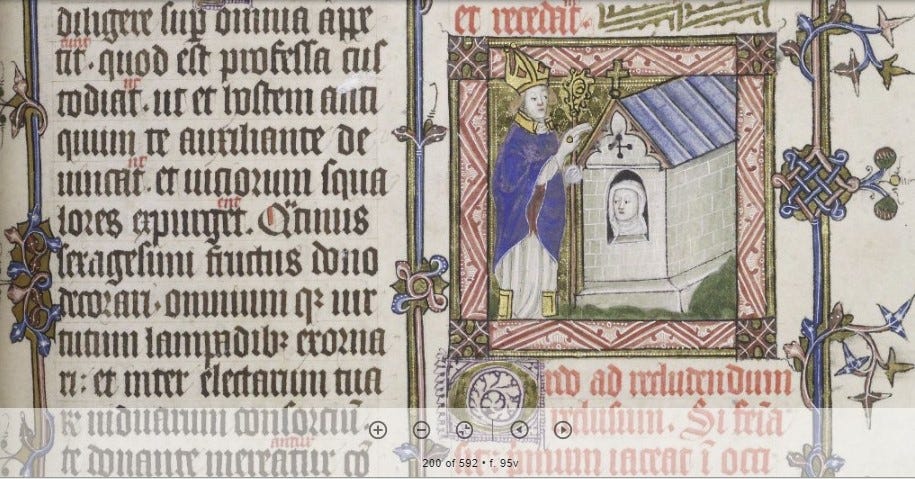
Anchorites had an acknowledged role in the English world of the Middle Ages, according to author Ann K Warren (1985, p7);
Encouraged, applauded, and supported by society and church, they undertook their solitary life by encamping in the heart of the community. Enclosed and yet exposed, hidden and yet visible, shadows behind the curtains of their access windows, medieval English anchorites were daily reminders of the proper focus of Christian existence. Martyr, viator, penitent, ascetic, mystic, miles Christi – the recluse was all of these.
We might recognise some of this in the asylum of the modern day Julian, camped in an embassy in the heart of London, hidden (for his security) but often visible in the virtual world as a regular reminder of the conscience still reachable within each of us.
Julian Assange
Assange entered his ‘seclusion’ in the London Embassy of Ecuador (on 19 June 2012) ‘voluntarily’, and after careful planning. [His action was “voluntary” in the same sense that many unwilling people currently give “informed consent” to ‘the jab’ when threatened with loss of their employment, income, (often long) career, pension, and even their family’s healthcare plan if they don’t.] It was, in that sense, an attempt to choose the lesser of two evils:
- Accepting extradition to Sweden, and then very probably on to the US in short shrift, as Sweden had been through these sideways extraditions before, or
- Abandoning hope for justice from the UK legal system, and leaving his friends and supporters to pay his substantial bond, while he took a step into limbo (of country, culture, language, and legal system) as a step towards – potentially – gaining political asylum in a “friendly” country, where he could restart his life and work. If asylum was not provided (it was not certain) he would be back at the first option, with nowhere else to turn.
There was no expectation on his part that this would be a lengthy stay – at worst a few months before he could, hopefully, leave the embassy under diplomatic protection and travel to Ecuador where that new life awaited him. Assange was not seeking a life of seclusion, but simply a protected space for the interim, much as those in an earlier age sought temporary protection at the altar of a church in a time of pressing danger, but not admission into the local religious order.
Nor did Ecuador expect to provide a secluded home for its potential asylee over many years. The small, ground floor apartment that housed the London Embassy already had all its rooms in use, and no facilities were available for even an overnight guest. The Ambassador at that time (Ann Alban) later spoke of such practical matters (8 Oct 2018) – someone had to be sent out to buy bedding so Assange could have somewhere to sleep the first night.
The “walling up” of Julian Assange was a protracted affair, as it took two months from his entry (19 June 2012) to the embassy (disguised, and on the back of a motorcycle) until the final announcement (16 Aug 2012) that asylum had been granted. It was also accompanied, not by solemn chanting and candle-lit ritual from within, but by pandemonium, police cordons, and diplomatic threats from without, as the UK threatened the unthinkable – an armed incursion into the embassy of another country, located on UK soil.
Ecuador claimed they received a “direct” written threat on Wednesday that authorities in London are prepared to storm the Ecuadorian embassy and arrest Assange if he is not delivered into their custody. The note was delivered to Ecuador’s Foreign Ministry and ambassador in London, Patino said.
“You need to be aware that there is a legal base in the UK, the Diplomatic and Consular Premises Act 1987, that would allow us to take actions in order to arrest Mr. Assange in the current premises of the Embassy,” the letter said. “We sincerely hope that we do not reach that point, but if you are not capable of resolving this matter of Mr. Assange’s presence in your premises, this is an open option for us.” […]
“The decision to strip the Ecuadorian Embassy of its diplomatic protection has not yet been taken, the spokesperson said: “Under British law we can give them a week’s notice before entering the premises and the embassy will no longer have diplomatic protection. We are not going to do this overnight.”
The threat to storm the Ecuadorian Embassy was “extremely serious” and illegal, WikiLeaks spokesperson Kristinn Hrafnnsson told AFP.
Police cordoned off the area around the Ecuadorian embassy in London in an attempt to disperse a gathered crowd of protesters. […] According to their reports, the livestreams from the embassy suffered from DDoS attacks. London police later moved in on the embassy after a press conference led by Patino. The foreign minister confirmed on Twitter feed that the police presence around the embassy was growing.
Ecuador stood firm under President Correa, and the UK eventually backed down.
[A lesson of which it is worth taking note.]
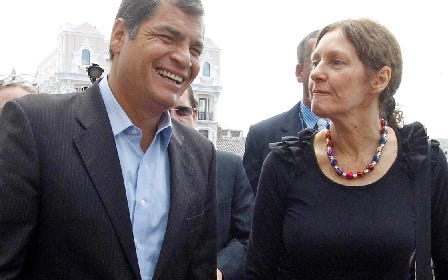
Speaking much later (20 Aug 2019) – after Assange’s eventual arrest within the embassy, with the collusion of President Lenín Moreno – about the “rule” governing Assange’s asylum, Fidel Narváez, diplomat at the Ecuadorian Embassy 2010-2018, addressed many false press reports on this topic. Citing a collection of “news” articles, he found forty points of misinformation to rebut. Among them he noted that:
It is false that Julian Assange “demanded” anything. Moreover, it is false that Ecuador provided Assange with a telephone connection — neither a landline nor a cellphone.
Assange did not use embassy phones for his communications. In any case, when CNN says “A guest with privileges,” why does CNN consider internet and telephone privileges? What internet speed does CNN consider a “privilege”? It is thanks to the internet connection that Assange was able to give hundreds of conferences and interviews, including to CNN.
Why is receiving visitors a privilege for a political asylee? A political refugee in not an inmate, and an embassy is not a prison.
Narváez made it clear that Assange, as an asylee, was not a “guest“ of the embassy in the ordinary sense, as he had no practical option to leave. What lay outside the door was arrest by the UK and probable extradition to the US – the very reason he was given asylum in the first place (as expressed both by Foreign Minister Ricardo Patiño at the time (16 Aug 2012), and later, Foreign Minister Guillaume Long (19 June 2016).
[While this analysis was much disparaged in the media, with Julian (and his supporters) often referred to as being “paranoid”, the stark truth of this assessment was to be displayed for all to see on 11 April 2019.]
Both Alban and Narváez touched on the topic of the “rules” of the embassy – much hashed over in the media, especially once Lenín Moreno became president (24 May 2017) – but both are aware that what is meant by this in ordinary conversation is more akin to expectations of appropriate behaviour on the part of both Assange and the embassy staff, rather than to regulations that could be broken.
This contrast, implicit in their discussions, exists because the only legal rules that surround conditions of asylum – in international law – relate to the ongoing obligation of the country that has agreed to provide asylum being (generally) to maintain it in the face of difficult circumstances. In contrast, there are minimal requirements made of the asylee. Once given, the circumstances in which asylum can be retracted by the “host” country are minimal, and have nothing to do with “good guest“ expectations of tidiness, hygiene, politeness, etc. Or how well the kitty litter is maintained.
[See articles 32 & 33 of the 1951 Refugee Convention and legal discussions re the principle of non-refoulement. The situation for Assange was complicated, and became somewhat more complicated, but this is not the place for detailed legal argument.]
Regardless, feedback from embassy staff of that time, and from visiting diplomatic staff from other embassies, spoke very positively not only of Assange’s behaviour as a “guest” under conditions of great stress, but also of the positive impact his presence had had on their own lives, and their understanding of the world.
Fidel Narváez, former consul at the Ecuadorian Embassy 2010-2018 (25 Oct 2019):
Contrary to what Moreno’s government led people to believe, there was mutual respect between Assange and the diplomatic and administrative staff at the embassy.
Ana Alban, [then] Ecuador’s Ambassador to the UK (8 Oct 2018):
You can say that there is an Ana before Assange and after Assange, because what we lived and experienced were very, very interesting and uncommon.
Julian represents so many things, and I always said that he showed me a world that I wasn’t aware that existed. I wasn’t aware of this Big Brother world that we live in, and since then I’m much more aware of the details. It’s not easy to think that in a city like London you can take the same taxi driver twice in the same day. A lot of things began to happen to me, and the people who [were] working in the embassy. […] You lose your mobile and then [it] “appears” three days after …
Alicia Castro, [then] Argentina’s Ambassador to the UK [14 Apr 2019]:
At that time, the embassy was crowded with interesting people who visited him; philosophers, politicians, musicians, designers … I had missed the visit of Zizek, Yoko Ono or Yannis Varoufakis, but in a next meeting I was meeting the designer Vivienne Westwood, human rights lawyer Helena Kennedy, filmmaker Ken Loach, Bianca Jagger, and mythical investigative journalists – such as the American Gavin MacFadyen, creator of the CIJ and the Australian John Pilger. Many of them are my friends until today. […]
Ecuador came to be at the centre of London’s political and cultural life, and former President Rafael Correa was recognized by the progressive sectors as a definite defender of human rights.
In each of my long conversations with Julian I learned something, that he is a man obsessed with a clear and uncommon mission: to democratize the truth.
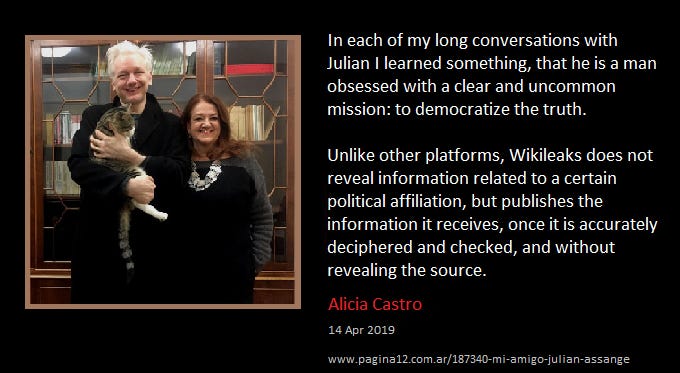
As with his long ago namesake, the political climate changed rapidly and radically outside Julian Assange’s place of seclusion with the advent of new figures in power. This had appalling repercussions for his life inside the embassy, especially from 2018.
Shifts in the “rule” of seclusion
Julian of Norwich
Shifts in power and circumstance during the long seclusion of Julian of Norwich included the advent of John Wycliffe (who she outlived), the first translator of the Bible into English, and a strong believer in giving ordinary people access to religious texts in their own tongue, and the growing number of Lollard priests who spread his views – a rising tide during her lifetime.
In opposition to such “democratisation” of access to the texts was Thomas Arundel, Archbishop of Canterbury, ably assisted by Bishop Henry le Despenser of Norwich (who, ironically, was probably the bishop who ‘examined’ Julian to determine her fitness to serve as an anchoress).
At the time when we can place Julian of Norwich at approximately seventy years of age, Archbishop Arundel was forbidding the Bible to be discussed in the English Language, more so, it was NOT to be discussed by people who were not priests and nuns. Julian lived and wrote in precarious times. [saieditor]
[The Lollard priests and their followers] voiced grievances and complained, not only about religious issues but life in general. It was therefore a short step for them to be labelled troublemakers by the authorities. By the late 14th Century, the unrestful peasants became embroilled in the Peasants Revolt, led by Wat Tyler (1381), As a result, Lollardism became associated with tradesmen, peasants, public disorder, licence and excess; these were excuses subsequently used to suppress the movement. [NorfolkTales]
King Henry IV was persuaded by the Church to pass the 1401 Statute “De Heretics Comburendo” (The Necessity of Burning Heretics). This Act
- Prohibited the translating or owning of heretical versions of the Bible and
- Authorised death by burning for all heretics.
While the church authorised those burnings, it did not carry them out. Those convicted of heresy were handed over to secular authorities for the final denouement. [Hold on to that concept. It has followed us down the ages. These days, though, it is states handing solutions to their perceived problems (such as enacting censorship and “public health” mandates) over to the transnational corporations.]
Many of the burnings (or more “compassionate” floggings) took place around Norwich. One of those condemned (in 1531) under this law was Cambridge academic Thomas Bilney.
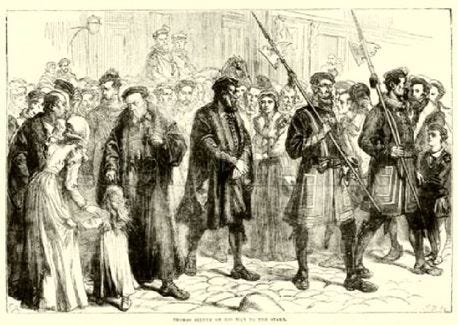
As the fagots were piled around him, Bilney raised himself to his full height and said in a firm voice, “Good people, I am come hither to die.” After reciting Psalm 143, he took off his outer garments and was bound to the stake. As the torch was applied to the wood, Bilney did not flinch. The flames burned high around his face, but a strong wind blew them away. Bilney stood firm as the pile was ignited a second and then a third time. The third time, the fire burned in full strength. Whatever pain the noble martyr felt appeared bearable, for Bilney held his head high as the flames rose in full intensity around him. He cried out one brief phrase in Latin, “Jesu, credo.” – “Jesus, I believe.” With that dying prayer of faith, Bilney sunk downward into the fire, and the flames consumed all that was mortal”.
Despite the danger to her from such edicts – she too could have been burned at the stake as a dissident / heretic- we have no direct evidence of the impact of those dangers on life in the cell of Julian of Norwich. Perhaps her seclusion protected her such that there were few outward changes, although she certainly would have had to live in full knowledge of the vulnerability generated by her writings. While that could have made her fearful, the progress in her writings (and her growing focus on the message in her “shewings” that “All will be well”) suggests the opposite, or at least that she did not give in to such fear.
These power shifts, though, will have impacted negatively on publication of her writings during her lifetime (and later shifts in power mean they were not first published until after the worst excesses of the 16th century Reformation period).
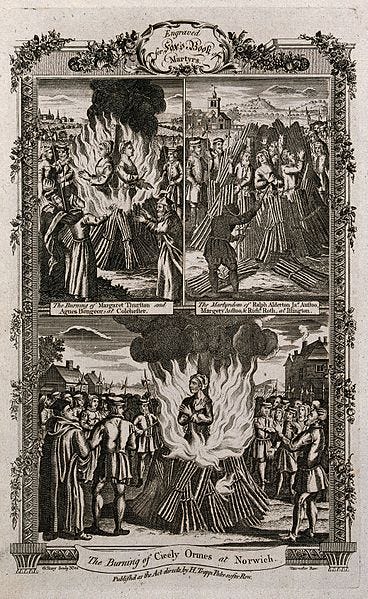
Julian Assange
In Julian Assange’s case, the pro-US President Lenín Moreno came to power (24 May 2017) near the end of his fifth year in the embassy, and the previous Ministers and senior appointees of former President Correa (who himself sought asylum in Belgium) were ejected from all positions of influence – including those working inside the London embassy.
Former Vice President Jorge Glas was elected along with Moreno, who then jailed him for corruption based on flimsy evidence. Glas then went on a lengthy hunger strike. He is still in prison today.
During the Correa Administration Julian had been mostly free to get on with his WikiLeaks work, researching, writing, editing and publishing much as in his previous life (where he largely lived out of backpack anyway), meeting and speaking with artists, politicians, internet developers, other journalists and more – either in person (in very small numbers since embassy space was severely limited), or via virtual connections.
He had friends who brought him food and other requirements (he was dependent on others since he couldn’t go out to shop, and the risk of poisoning from ordering in food was very high). They presumably also helped with other practical issues. The few doctors willing to attend him had to make a “home” visit. This was another source of distress, as he needed dental work and an MRI for frozen shoulder, neither of which could be done in the embassy. [It was the health problems he was enduring that prompted his medical advisors to seek help from new directions. Their report eventually reached the desk of Nils Melzer, the UN Special Rapporteur on Torture. The long history of responses of this courageous man will be covered in my next essay.] Julian could not go outside at all (apart from a few speeches given from the balcony, also very risky) so could not access sunshine, or feel the wind on his face.
By and large, though, he could live a productive, and even fairly enjoyable life.
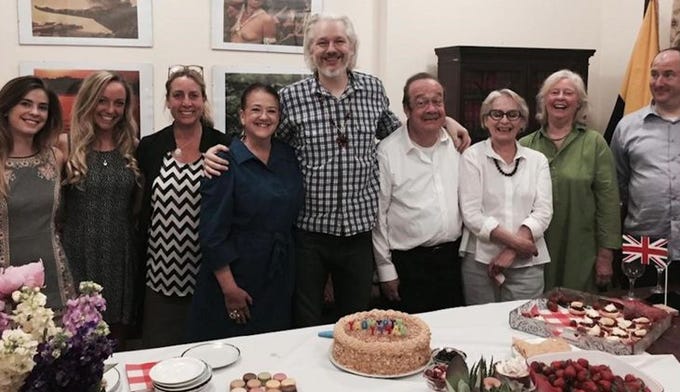
But then things changed. As Fidel Narváez, diplomat in the embassy 2012-2018, noted (20 Aug 2019):
An embassy is not a jail — although in the last year, Lenín Moreno’s government did convert his embassy in London into a de facto prison.
On 25 March 2018, Ecuador electronically jammed communications within the embassy, cutting Assange off from all contact via phone or internet. For a period, all visitors were banned. (I’ll discuss the proximate context for this in the next section.)
On 11 October 2018 Ecuador delivered a 32 point “Protocol“ to Assange, unilaterally dictating a new “rule” for Julian’s asylum. [ES Official and EN Unofficial versions] Accepting its terms would have ensured he could hardly open his mouth publicly, let alone carry on with his journalistic work. He was also lectured about his cat.
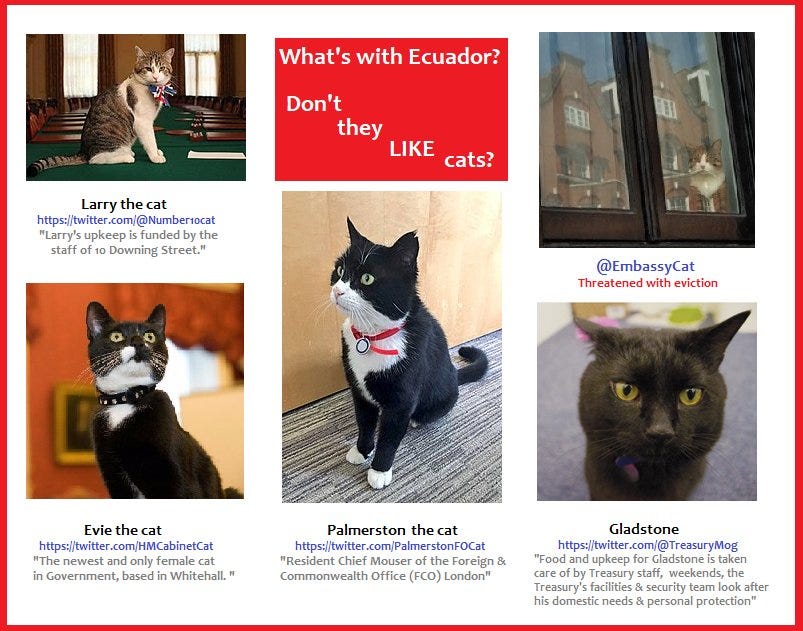
Assange lawyers Carlos Poveda and Baltasar Garzón contested the legality of the protocol in the courts of Ecuador, on human rights and constitutional grounds, but were obstructed at all levels.
By 22 November 2018 there was no-one left at the embassy with whom Assange had any kind of warm relationship. Around this time, Italian journalist Stefania Maurizi was finally permitted to visit (her report was published 26 Nov 2018):
After eight months of failed attempts, la Repubblica was finally able to visit the WikiLeaks founder in the Ecuadorian embassy in London, after the current Ecuadorian president, Lenin Moreno had cut him off from all contacts last March with the exception of his lawyers. […]
As soon as we saw him, we realised he has lost a lot of weight. Too much. He is so skinny. Not even his winter sweater can hide his skinny shoulders. His nice-looking face, captured by photographers all around the world, is very tense. His long hair and beard make him look like a hermit, though not a nutter: as we exchange greetings, he seems very lucid and rational.
The beard, noted (above) by Maurizi, was in full evidence only a few months later, on the day of his eventual arrest (11 Apr 2019), and was often cited in the legacy press as indicative of his ‘degeneration’ into unacceptable hygiene and behaviour. It was not until later that Ray McGovern disclosed that the embassy had confiscated Julian’s shaving gear from him as they prepared for his coming eviction. McGovern himself stopped shaving as a protest against this treatment of Assange.
After visiting Assange late 2018, Angela Richter wrote [January 2019, in German here]:
It is just before Christmas, and Julian Assange has probably just had the worst time of his stay at the embassy. Since March 2018 he was de facto in isolation, no telephone, no internet and no visits. The internet ban must be particularly difficult for him; it was not only his field of work, but his only access to the world.
The mood in the embassy is tense; the new ambassador is due to arrive. They have turned off the heating and taken the bed, he sleeps on a yoga mat. [Richter later conceded she may have misunderstood about the bed – she didn’t go into his room.] I cannot help the impression that everything possible is being done to make his stay so difficult that he finally gives in and leaves the embassy voluntarily. […]
His stay in the embassy, granted as political asylum in 2012, now resembles more and more a detention with rigid punishments. The isolation has still not been completely lifted, from Friday evening until Monday morning there is still a ban on contact, and anyone who wants to visit him has to submit a formal application to the embassy.
Alicia Castro, recalling events late in the nearly seven years of asylum (14 Apr 2019):
The next ambassador prescribed stricter visiting conditions; there was hardly any food one night when former Foreign Minister Ricardo Patiño visited him …
The last times I saw him, his situation was worrisome. He was being spied on, and had a ribbon hanging from his neck with a series of pen drives. We talked in the dining room, around that table where we met for the first time, raising the volume of the radio and writing part of what we wanted to say, exchanging two notebooks and covering our heads to avoid cameras and microphones. He would never give up.
Such was the level of threat felt by Assange, in what should have been a protected space of asylum, that he even felt the need to send his (now only) warm companion, Embassy Cat, to a safer place.

WikiLeaks’ Hanna Jonasson tweeted (26 Nov 2018):
In the same document in which Ecuador threatened to hand Assange over for arrest, Ecuador also threatened to put Assange’s cat in the pound. Incensed at the threat, he asked his lawyers to take his cat to safety. The cat is with Assange’s family.
They will be reunited in freedom.
At an earlier time (2014), Julian spoke about the role fear has played in his life and work: “Courage is not the absence of fear; only a fool has no fear. Courage is seeing the fear and continuing to proceed.”
His views are cemented in the tagline of the Courage Foundation (which he helped to found in 2013): “Courage is contagious”. Those who support him are ever hopeful that there will be a mass outbreak of this ‘virtuous virus’.
Despite his own courage, the 2018-2019 winter was long, mostly lonely, and cold for Julian Assange, ending in an even more difficult spring.
MUSIC VIDEO: “Let The Light In – Jude The Obskure for Wikileaks Art with Maria Milewska & Alex Hills” (2019) [YouTube]
MORE music to enjoy while you read on (with lyrics that begin by alluding to Little Gidding) …
Working in seclusion
Julian of Norwich
Julian of Norwich was still alive at the time (1413) The Short Text was first copied – that information is embedded in its heading (see image below). Unfortunately, there are no surviving writings about her working life by her parish contemporaries, so our knowledge of how she worked, and what she did during her many decades as a recluse, must be read from scant clues within her extant texts, or projected from the surviving “rules” of her day.
A summary of the Ancrene Wisse (or Riwle) – a thirteenth-century English guide for anchoresses influenced by the standard sources that influenced Aelred of Rievaulx‘s own guide a century earlier – discusses the daily life of the anchoress:
It has been estimated that the standard devotions would have taken the anchoresses four hours. Add to this liturgical services, private prayer, meditation, and devotional reading. Though reading has its limited sources, the passages [suggested in the Riwle] clearly suggest three things:
- the ability of the anchoresses to read, which hints at their social status,
- the availability of material for them, and
- the author’s own sense of the importance of the written word in producing the Ancrene Wisse for the sisters.
Her day would have been structured around her schedule of prayer, which would have matched that of the religious community, including these set times daily:
– Matins – sometime after midnight
– Lauds – just before dawn
– Prime – soon after Lauds, about 6 a.m.
– Terce – about 9 a.m.
– Sext – at noon
– None – at 3 p.m.
– Vespers – in early evening
– Compline – at bedtime
It is not certain whether Julian of Norwich physically wrote her texts, using a quill pen, ink (from natural products), and parchment (from animal skins), or whether she dictated them to a scribe – no original text in her hand has come down to us.
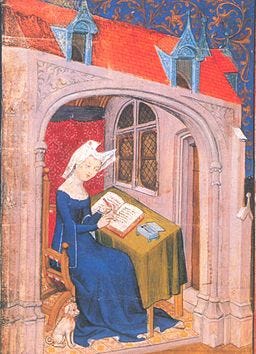
The first view we have of The Short Text is a 15th century copy – The Amherst Manuscript, clearly dated 1413, but possibly written out by its scribe as late as 1435. This was a compendium of various writings thought suitable for a later anchoress. [umilta]
Although The Amherst Manuscript was probably written out by a man (possibly the Carmelite Richard Misyn), many women were also engaged in the writing and making of medieval texts.
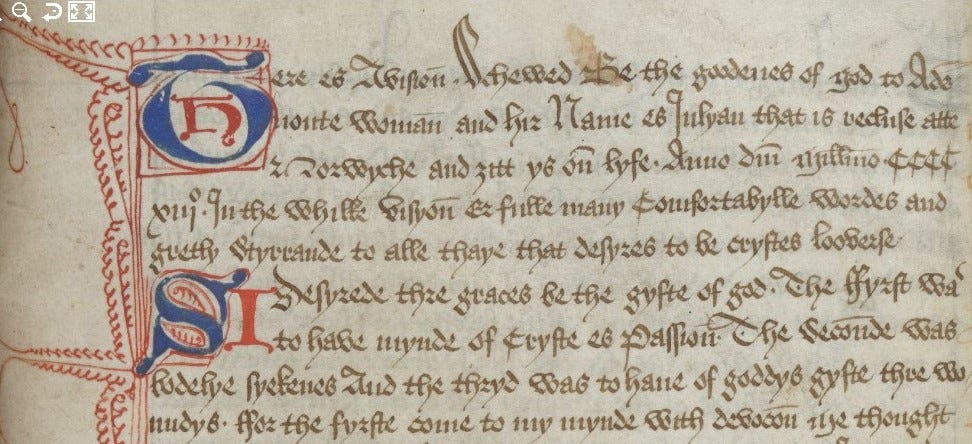
In “Women Scribes: The Technologists of the Middle Ages” Lady Science wrote:
If we broaden our definition of what “writing” means to include the entire process of making a book, we find women further pushing against social norms to share their lives and experiences. Hildegard, who received holy visions, directed the making of her books, even if she did not perform the labor of writing. This image from her Liber Scivias depicts her receiving a vision from God in the form of flames, and dictating to a monk, who copies her words while she is making sketches on a wax tablet.
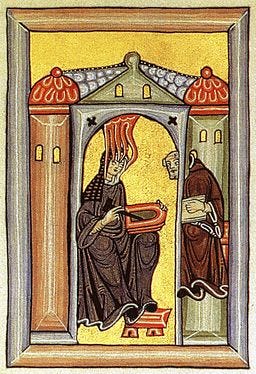
Another well-known example is that of late-medieval English mystic Margery Kempe, who dictated details of her life and conversations with God to a scribe and a priest. The resulting Book of Margery Kempe, is often regarded as the first autobiography in English.
Lynn Staley has produced a detailed commentary on that book (especially relevant since within it, Margery Kemp bears witness to the spiritual counsel of Julian of Norwich as the only extant writer who actually met her). Staley notes:
The comments recorded throughout the manuscript of the [Kempe] Book are important because they suggest ways in which medieval texts were seen as communal and therefore as meriting commentary that linked them to the values of the communities in which they were housed and read. In the truest sense, they were living documents, and the margins of medieval manuscripts bear witness to the perceived relevance of the written word.
This could be a description of a medieval version of a Wiki – a collective production that grows and shifts in shape, but where each change is linked to its author, and the history of changes is maintained along with the current text.
While The Amherst Manuscript might be the oldest extant copy of Julian’s work, it clearly was not the first, as several items (such as translations from scripture) which would have proved dangerous to publish at this time were omitted from this copy – Archbishop Arundel was hard at work on his burning mission – but reappeared in later versions, presumably from the original or from uncensored copies still in existence at that time.
Why did Julian write in English?
- Possibly from necessity if she did not know Latin, but those who know her work intimately see not only an author familiar with Latin, but also Hebrew.
- Possibly from a particular desire to communicate directly with her fellow Englishwomen (and men), in the urgent, life-filled language of the vernacular.
This question was not simply one of authorial taste, or religious perspective (such as taking a position in the Wycliffe / Arundel dichotomy). It was also a political question in this period [just as in our own time questions of support for particular policies related to issues of ethnicity, culture and gender might be discussed openly in one set of terms while serving some other, covert, political agenda – and might lead to unexpected consequences.]
Edward III, who was King of England 1327–77, almost matching Wycliffe’s life, wanted to regain some of the territory in France, which he considered to be his by ancestral right. He is known for starting the Hundred Years War with France. But in order to get the support of his English nobles, the King built up anti-French sentiment by emphasising English and Englishness.
The new value he put on the English language is exemplified in a 1362 Act of Parliament, known as the Statute of Pleading, that insisted law courts operate in English. Parliament also opened for the first time in English in 1377. This was also the period when Chaucer began writing in English. [From Wycliffe.org]
An essay on the Umilta website traces other copies of Julian’s texts, and discusses the way corrections, changes, and comments in the margins both add to the text and go some way towards identifying the hand of each scribe and the sources from which they are working.
There are eight manuscripts representing three versions of Julian of Norwich’s Showing of Love. The three oldest manuscripts are generated within Brigittine surroundings, both at Syon Abbey and in exile from England; later copies of one, or perhaps two, of these then being made by English Benedictine nuns in exile. In all of these contexts, the texts of the Showing of Love, the Revelations, are presented for women in monastic contemplation.
The Paris Manuscript (written out about 1580 near Antwerp, then was taken to Rouen and finally entered the Library of the King of France in 1706) is what is now called The Long Text.
It also includes the famous passage, ‘All shall be well and all shall be well and all manner of thing shall be well‘. Again Julian is translating from the Hebrew into English, rather than from Jerome’s Latin. For 2 Kings 4 [verses 23 & 26] in the King James, which is translated from Hebrew, so translates ‘shalom‘, which has the meaning of ‘all‘, ‘wholeness‘, ‘all being well‘, where Jerome and Wyclif merely had it be ‘Recte’ and ‘right’.
A whole network of women and men, both enclosed religious and lay admirers of her writing, has surrounded and celebrated Julian’s words from her own time to ours – a veritable Team Julian spread across countries from Britain to (eventually) Australia, and spread across the “between time” and continues into the future. They have been drawn to the optimism of her message (written in a time of recurring plague, religious and political upheaval, and omnipresent danger to dissident thinkers.) More, they have been drawn to (and energised by) her message of love – omnipresent, enduring, and nourishing – at the heart of all life.
As with the “little thing“ – about the size of a hazel nut – that she was shown in the fifth Revelation as being “all that is made”, we can see through her eyes that we live in a world that is whole, with all its elements being essential parts of the whole. Perhaps if we can connect with the warmth glowing from within her text, we can also come to know and include ourselves in the love imbued in “all that is made” – as its life’s blood and intrinsic intelligence.
Also in this He shewed me a little thing, the quantity of an hazel-nut, in the palm of my hand; and it was as round as a ball. [Is this a visualisation of planet Earth?] I looked thereupon with eye of my understanding, and thought: What may this be? And it was answered generally thus: It is all that is made. I marvelled how it might last, for methought it might suddenly have fallen to naught for little[ness]. And I was answered in my understanding: It lasteth, and ever shall [last] for that God loveth it. And so All-thing hath the Being by the love of God. In this Little Thing I saw three properties. The first is that God made it, the second is that God loveth it, the third, that God keepeth it.
[Chapter V, The Long Text pdf]
Perhaps, in re-reading the texts of Julian of Norwich in our own time of recurring ‘plague’, religious and political upheaval, and omnipresent danger to dissident thinkers, we can re-learn trust in ourselves, and again find faith in a positive future.
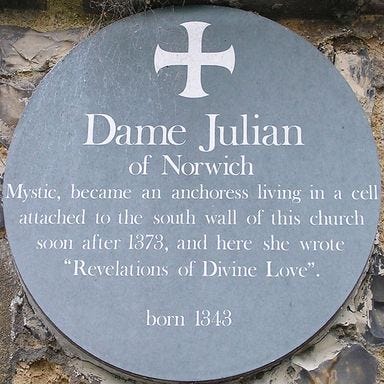
Julian Assange
In early 2020, John Shipton (Julian’s father) was interviewed for an RT documentary . [If you are looking for good coverage of the history of WikiLeaks, with a lot of original footage, this is a good place to start.]
He was asked about the beginnings of WikiLeaks. [Transcript here.]
JS: Julian was at my place and we were having a cup of tea.
And Julian said I’d like to start a Wiki. And this wiki would concern itself with leaks.
And we would use the Tor (which was developed by the American Navy) as an anonymizer for people who wanted to leak information and had that information published.
KR: And you weren’t caught by surprise when he told you this?
JS: No, I thought that was a good idea.
What resulted was WikiLeaks. Its website states:
WikiLeaks specializes in the analysis and publication of large datasets of censored or otherwise restricted official materials involving war, spying and corruption. It has so far published more than 10 million documents and associated analyses.
“WikiLeaks is a giant library of the world’s most persecuted documents. We give asylum to these documents, we analyze them, we promote them and we obtain more.” – Julian Assange, Der Spiegel Interview
Although no organization can hope to have a perfect record forever, thus far WikiLeaks has a perfect [record] in document authentication and resistance to all censorship attempts.
Julian Assange, through WikiLeaks, has been the publisher responsible for the largest and most comprehensive collection of ‘public interest‘ leaked materials (from both states and corporations) ever made. Founded in 2006, WikiLeaks was publishing before Assange went into the embassy, published profusely while he was free to work inside the embassy, and continued to publish (under new editor-in-chief, award-winning Icelandic journalist Kristinn Hrafnsson) after Julian was electronically gagged (28 Mar 2018) by Ecuador.
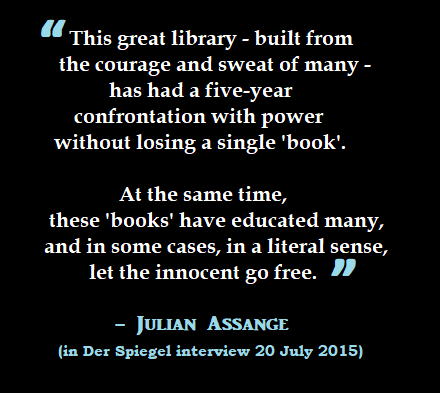
Although the WikiLeaks publications cover leaks from or about many countries (from France, Kenya, Iceland, Germany, the UK and US, to Russia and beyond), there are four main groupings of leaks and/or commentary that are relevant here:
- 2010-11: The Manning leaks
These include the video “Collateral Murder” (released 5 April 2010), the Afghanistan & Iraq Warlogs, Cablegate, the Guantánamo files, and the US Rules of Engagement.
These leaks were partly published prior to the first arrest (7 Dec 2010) of Julian Assange and are the subject of the current (2020) US indictment which has lead to the current extradition request and hearings in the UK.
Their publication pre-dates Assange seeking asylum in the Ecuadorian embassy (19 June 2012), and the US reaction to them (the empaneling of a Grand Jury during the Obama regime) was part of the basis for Ecuador granting that asylum. Public death threats from US politicians began in this period. - 2016: The 2016 US election leaks
These include the DNC / Podesta / Clinton archives.
While these releases are not the subject of the current US indictment, they seem to constitute the underlying source of public clamour, in the US, to see Assange imprisoned (or worse), as most Democrats hold these leaks (and Julian as the publisher of them) responsible for the defeat of Hillary Clinton by Donald Trump in the 2016 presidential election.At the time, Assange discussed key elements of these disclosures with John Pilger, including what he considered to be the most important content – the exposure of Saudi and US involvement in the rise of ISIS, and the role of the Clinton Foundation in that (and other) international problems (such as the destruction of Libya, and the great wave of refugees that followed).
[YouTube] [Transcript]
-
2017: The Vault 7 & 8 leaks (CIA cyber-weapons)
While little talked about in public (perhaps due to their very technical nature), knowledgeable analysts have identified the Vault 7 publication of details of CIA cyber-weapons – pieces of code designed to achieve all sorts of nefarious ends (including covert surveillance, remote data manipulation and data destruction) and deadly outcomes (such as taking over the controls of a car or plane from a distance) – as the primary source of virulent antipathy to Assange in the intelligence community, especially as expressed by Mike Pompeo in his first speech (13 Apr 2017) as Director of the CIA.[Note that the Twitter account labelled Defend Assange Campaign was, at the time, the personal Twitter account of Julian Assange.]
- 2017-18: The Catalonia / Spain commentaries
In September 2017 the Catalan government attempted to run a referendum on whether to declare independence from Spain. This set off what has been called the “world’s first internet war” (30 Sept 2017). While Google fought in cyberspace on the side of the Spanish government (assisting in shutting down websites and apps required to run the referendum), there were also plenty of armed forces in “meat space” available to gas, beat and arrest Catalan citizens (over 900 citizens were injured).Julian Assange joined in on the side of the right of Catalans to self-determination, offering advice on secure messaging (which seems to have earned him their undying affection and gratitude, as well as their “Dignity Award“).
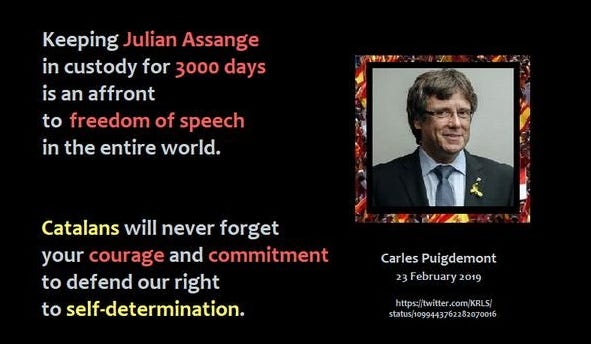
IMAGE: Carles Puigdemont (2019) TEXT SOURCE: [Tweet] After the referendum was over, Julian talked with Democracy Now (10 Oct 2017) about the background to the mayhem. He explained that “WW II began in Spain”, and went on to show that fascism was never defeated there:
“[The fascists] won WW II in Spain. Franco won in Spain, and he continued on, with us backing him up until 1975, when he died peacefully in his bed. But there was not a revolution in Spain; there was [no] occupation that pressed the reset button on the existing families, and institutions, and class structure in Spain.” [Full transcript]
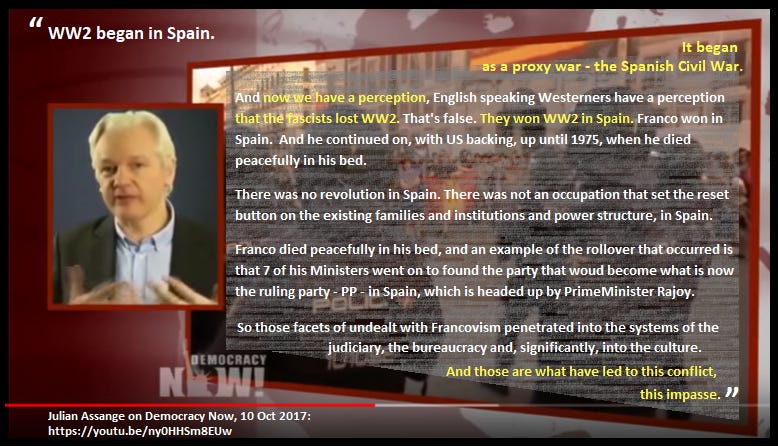
IMAGE: Julian Assange “WWII began in Spain“. SOURCE: Democracy Now The Catalan matter didn’t ended there. The Spanish government then sought to have Carles Puigdemont (the elected president of Catalonia) arrested in Germany, and have him extradited to Spain for prosecution, a proposition that chimed with events in the Nazi era. Julian Assange stepped into this topic as well (25 Mar 2018) via a tweet:
That was one step too far for Ecuador, who would no doubt have been facing serious pressure from Spain, a major ally. While many outside Europe (and even many within) had taken little notice of this particular topic, it was this tweet that was the proximate cause (or at least was given as the excuse) for the electronic gagging of Assange.
WikiLeaks reported (28 Mar 2018) that all Julian’s communication had been cut off, and followed with a little more information a few days later. This was the beginning of the end, although the rollout of Assange’s expulsion from his asylum took another year (as discussed in the previous section).
- The missing commentaries:
Julian has never had the opportunity to comment on the coronavirus “pandemic”, nor on related government policies (“lockdowns” – a prison term, “social distancing” – first used by Lat-Am military regimes, as discussed in my previous essay, widespread mask and now “jab” mandates) enacted around the world. He has been shut out of the internet (ie unable to receive information in bulk, so unable to process it through that formidable intellect, publish it or usefully comment on it), gagged, and in lockdown in HMP Belmarsh for the full duration of this international event.The only word on this topic has been from Julian’s father (16 Nov 2021):
He has been vaccinated, of course, because ALL of the prisoners in the jail have been vaccinated. So he has no choice in this. No choice about anything. He has no control over his body. What his thoughts are, are his. The rest is in the complete control of the jail administration.
Given the plethora of commentators assessing these draconian “public health” policies – enacted on multiple populations – as medically unwarranted, “hysterical”, and even “fascist”, one has to wonder how Julian Assange, in his better days, would have related our current situation to his understanding of the cycles of history, as touched on in the Catalonia commentaries
Similarly, he has been “locked down” since before the advent of Extinction Rebellion and the fascistic discourse now emanating from many sources related to “Climate Change” – a topic I will address on this platform in a coming series. While WikiLeaks has published many leaks related to the relationship between states and the fossil fuel companies, and the willful corporate abuse of the environment (“all that is made”) all over the world, that is not the same thing as an analysis of the current discourse of the “Climate Change” agenda.
My own feeling is that his absence from such debate as can still take place – in the face of brutal and ever increasing censorship – has been part of the central purpose of his continued incarceration.
The absence of his energy and intellect driving the “intelligence agency of the people” has impoverished us all, just as these topics have begun to completely reshape the near and distant future of humanity.
Two other matters in which Julian Assange has been involved have also raised ire in various quarters:
- Scientific journalism
Assange’s prosyletising on the topic of “scientific journalism” – his insistence on the linking of all assertions in journalistic reports to documented sources, justifying any statements or conclusions reached – did not endear him to other journalists. In adopting this practice – now perfectly feasible in all online news articles due to internet hyperlinking capacity – ordinary readers would be empowered to immediately check the veracity (or otherwise) of statements, and those journalists who could not properly support their statements would be shown up as wafflers (or even dishonest voices).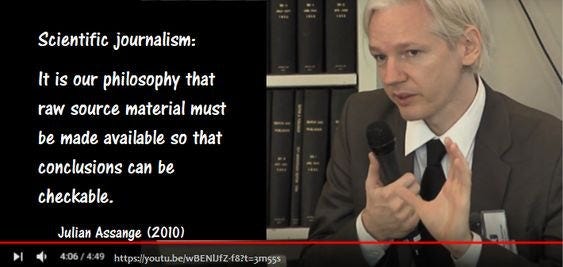
IMAGE: Julian Assange at at the Logan Symposium (18 Apr 2010) held at the Berkeley Graduate School of Journalism. SOURCE: [YouTube] While this has attracted derision and antipathy from legacy media figures (or been ignored) for obvious reasons, some media organisations have embraced this principle, even for their streaming services (or post-broadcast videos) as well as textual media. A great exemplar is the UK Column thrice weekly news streams (currently very occupied with the coronavirus topic) where links are posted on their site (under the videos) within 3 hours of broadcast, to every article or source of data discussed that day. Another is The Corbett Report, which provides detailed source materials for all their videos. ICAN’s weekly broadcast The Highwire sends links to all materials used in their broadcasts to anyone who signs up ( for free) for their newsletters.
If ‘lone wolf’ commentators, and/or small groups of researchers and journalists can do this, one has to ask why the well resourced “trusted news” networks can’t do the same. [Most don’t even put the date on their broadcasts, rendering many video records of such broadcasts ahistorical.]
- The Edward Snowden escape
Finally, when Edward Snowden, NSA whistleblower, made his disclosures in May 2013, it was Julian Assange who strategised his escape from US custody, sending WikiLeaks staff member Sarah Harrison – referred to by Snowden as a “ninja“ – to Hong Kong. Her role was to shepherd him to his own asylum (intended as Ecuador, but which became Russia after the US cancelled his passport when he was en route). She did a great job.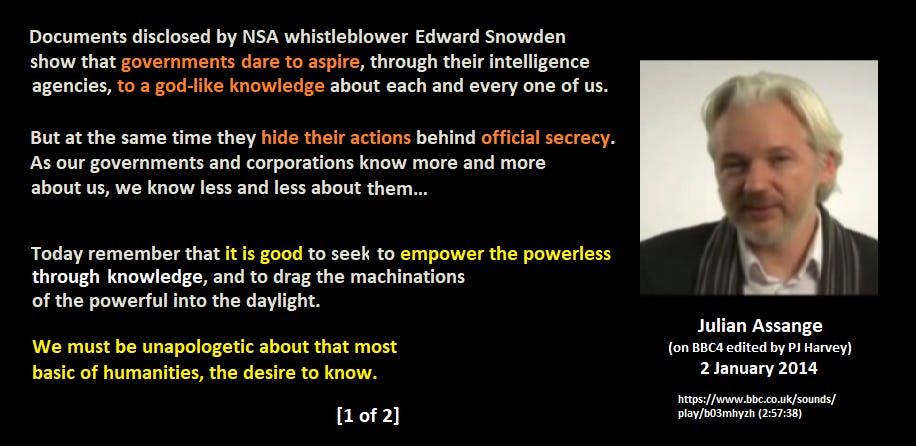
IMAGE: Empower the powerless Julian Assange, Thought For The Day. .SOURCE: BBC4 (2 Jan 2014) [BBC4 at 2:57:38] [YouTube] Assange said of this use of WikiLeaks resources:
“We thought that it was very important that a star source like Edward Snowden was not put in prison. Because that would have created a tremendous chilling effect on other sources coming forward.”Snowden was the other named “enemy” of the US mentioned in Pompeo’s infamous (13 Apr 2017) tirade. His escape from US clutches added to the antipathy of the intelligence community towards Assange.
All this has led to the strange situation whereby most of the emotional, psychological and political energy behind the ‘’lawfare’ onslaught against Assange is actually rooted in matters other than those for which the UK is now holding him, and for which the US seeks his extradition.
There is a warning in this. If Assange were to be extradited (and to survive that process), and then to fight his case to a successful acquittal at the US Supreme Court level – a process that could take a further 6-10 years – the US still has a great deal more material up its sleeve on which it could start the process all over again. And much of it has been generated by Assange (and colleagues) while he was ensconced, as a “recluse”, in his small room behind the brick walls of the Ecuadorian embassy in London.
“Ordinary” journalism
As if all that were not enough, Julian Assange has also produced some journalism of a more traditional kind from within the embassy, such as his 7.5 hour marathon talk show panel on the night of the Brexit vote (26 June 2016). While this was of the kind of journalism more often seen on Democracy Now (in the US), the BBC, or cable news shows, it certainly differed in terms of length, breadth, and richness of analysis. This too showed up the pathetic state of ‘mainstream’ journalism in our era.
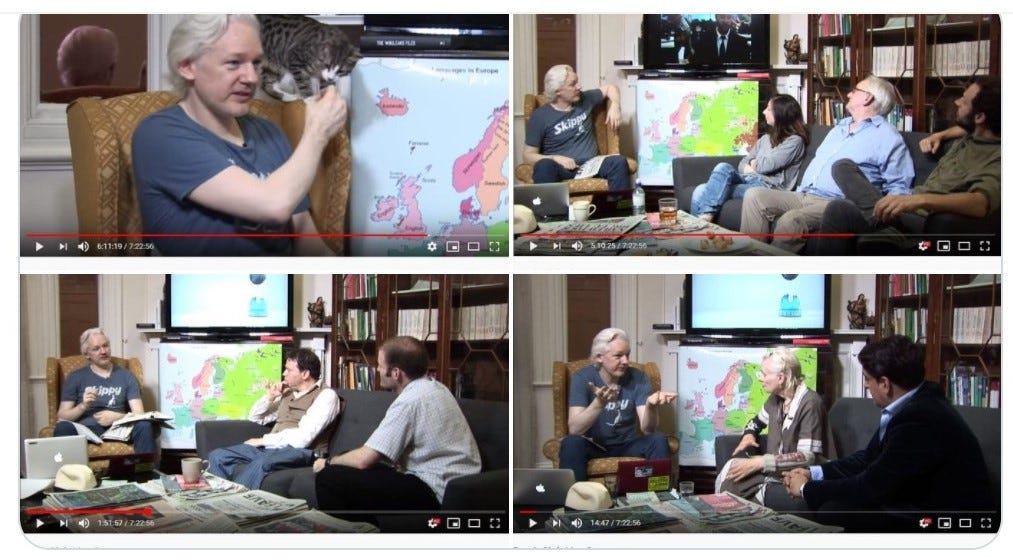
If Julian Assange had been a religious recluse, what should he have been doing with his time in seclusion? Trappist monk Thomas Merton (1915-1968) wrote, in the author’s note to “Seeds of Destruction” (July 1964):
The monastic withdrawal from secular time is then not a retreat into an abstract eternity but a leap from the cyclic recurrence of inexorable evil into the eschatological Kingdom of God, in Christ – the kingdom of humility and forgiveness.
The Adversary is not time, not history, but the evil will and the accumulated inheritance of past untruth and past sin. This evil the monk must see. He must even denounce it if others fail to do so.
What is the meaning of this “denunciation”? Is it to be regarded as a political act in the sense of an expressed determination to influence politics? Perhaps, indirectly so. I speak not only as a monk but as a responsible citizen of a very powerful nation.
Assange was not bound by religious vows – certainly not the vow of chastity. Just as well, as some of the fruit of his time as a “recluse” behind the walls of the embassy have been a committed relationship with his fiancée of five years, lawyer Stella Moris, and the conception and birth of two beautiful children.

But if he had been following the guidance for a monk set out (above) by Thomas Merton, he has certainly been working hard, right on task:
He must SEE the evil will, and the accumulated inheritance of past untruth and past sin, and
He must even denounce it – if others fail to do so.
Julian Assange, a practicing Catholic, was asked by P J Harvey, BBC4 guest editor for the day on 2 Jan 2014, to present the Thought For The Day. [BBC4 at 2:57:38] [YouTube]
It could be said that the central raison d’être of WikiLeaks is the exposing of Merton’s “accumulated inheritance of past untruth” and, conversely, exposing past and present truths via validated documentary evidence (in order to promote justice).
In his Thought For The Day he looked at this mission through the lens of church history, including surveillance via the confessional, and church resistance to secular publishing, ending with this commentary on the fate of all secrets:
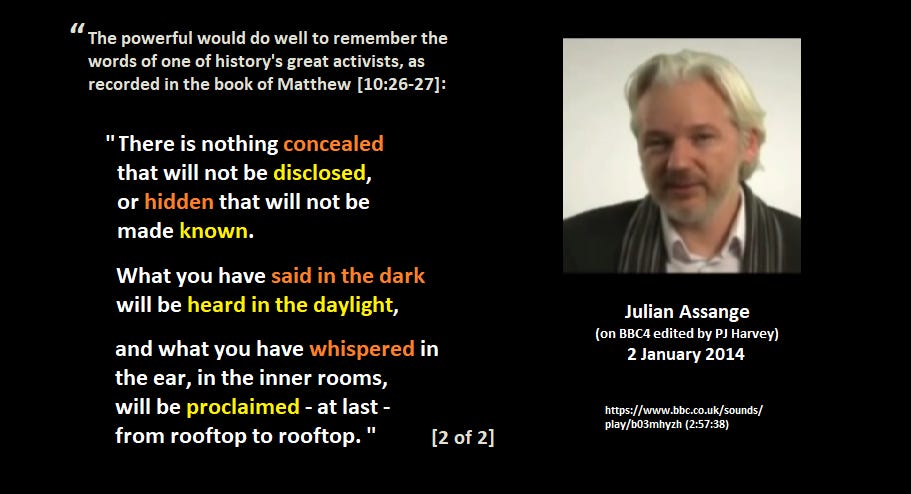
End of seclusion
Julian of Norwich
For Julian of Norwich, the end of her time as a recluse was, and always was intended to be, her death. Leaving her seclusion alive would have resulted in excommunication from the church.
No specifics are known of the circumstances of that death, not even the date – some time after 1416 (the date specified in The Book of Margery Kempe for Kempe’s visit to Julian to consult on spiritual matters) but possibly as late as 1430 (the date offered by Pope Benedict XVI).
It was common for recluses to be buried in their cells, with the Ancrene Wisse going so far as to recommending that an anchoress harden her hands by using them to dig her grave in the dirt of the cell floor – to ward off temptations of the flesh:
For herself to look at her own white hands does harm to many an anchoress who keeps them too beautiful, like those who have nothing at all to do. They should each day scrape up the earth of their graves, in which they will rot.
Christiana Peterson referred to this pre-dug grave as the fourth window of the cell:
She has already confessed her sins, been given last rites and declared dead to the world. Still, this fourth window, a hole that leads nowhere, helps her remember her death; it is her very own grave dug into the earth and stone of her anchor-hold.
[While the fourth window “lead nowhere’,’ the three other windows allowed for potential surveillance from the exterior. Fortunately, Julian had window coverings that were in her control and, in that era, there were no cameras or microphones that could breach her privacy.]
Julian’s cell was probably torn down during the Reformation, and later the church itself was mostly destroyed during the WW II blitz; the current cell (which includes a door into the rebuilt church that may not have existed at the time) is not the original cell Julian occupied, and may not even be in the correct place.
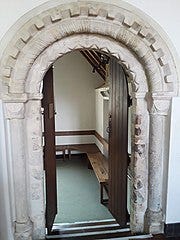
According to Canon Michael McLean, former rector of St. Julian’s, the dimensions of Julian’s cell, probably built against the church’s south side, were almost certainly smaller than the site that visitors see in the present building, reconstructed after the bombing of June 27, 1942. Though most opinion accepts the present site, Canon McLean observes that at least two ancient maps show a cell in different positions alongside the churchyard wall. It had been assumed that Julian’s cell was destroyed at the time of the dissolution in 1539, but it is now believed that the structure, which may have been of timber on stone foundations, simply fell into ruins after the Reformation. [Rochester]
So we do not know where her earthly remains came to rest at the end of her seclusion. But her optimistic spirit still speaks loudly from the texts she left behind, and her warm presence is evoked by imagined images of her (and her cat) in historic stained glass as well as modern art works.
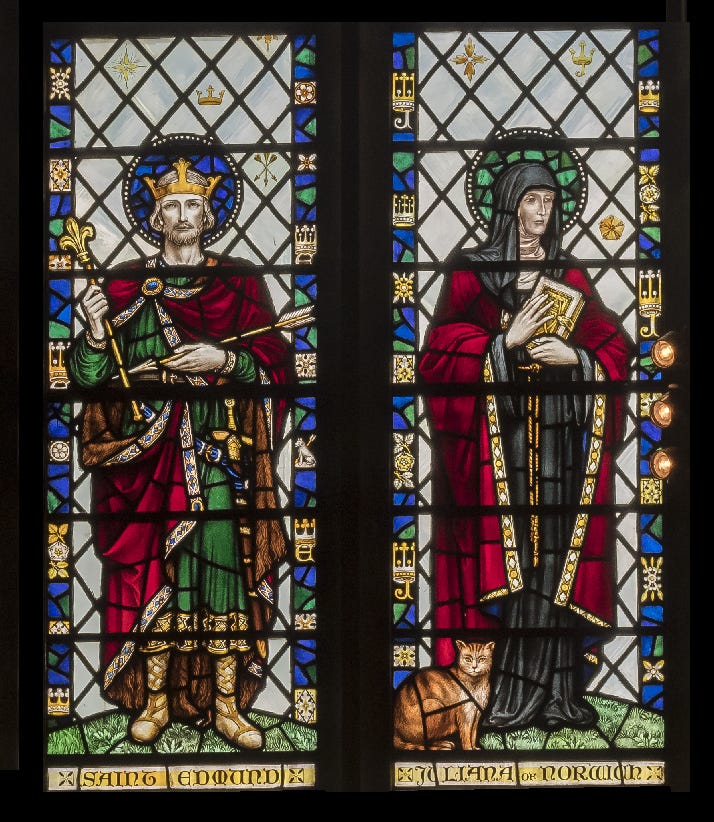
Julian Assange
I have already discussed some of the horrifying treatment of Julian Assange by Ecuador – who had promised asylum but, after Moreno, provided only a prison.
Justice for Assange summarised many of the related events (and documents), beginning with his gagging (March 2018) and including legal action by Assange in the Ecuador courts to 30 Oct 2018 in an (unsuccessful) attempt to get redress. They also reference Moreno’s meeting with US Vice President Mike Pence in this period.
On 21 Dec 2018 UN experts urged the UK to honour its rights obligations and “let Mr Julian Assange leave Ecuador embassy in London freely.”
“States that are based upon and promote the rule of law do not like to be confronted with their own violations of the law, that is understandable. But when they honestly admit these violations, they do honour the very spirit of the rule of law, earn enhanced respect for doing so, and set worldwide commendable examples,” the United Nations Working Group on Arbitrary Detention (WGAD) said.
In December 2015, the Working Group concluded in its opinion No. 54/2015 that Mr. Assange – who at the time had a European arrest warrant issued against him for an allegation of crimes committed in Sweden ‑ was being arbitrarily deprived of his freedom and demanded that he be released. […]
The WGAD is further concerned that the modalities of the continued arbitrary deprivation of liberty of Mr. Assange is undermining his health, and may possible endanger his life given the disproportionate amount of anxiety and stress that such prolonged deprivation of liberty entails.
“The United Kingdom has ratified the International Covenant on Civil and Political Rights (ICCPR) and has a responsibility to honour its commitment, by respecting its provisions in all cases,” the experts said. […]
“It is time that Mr. Assange, who has already paid a high price for peacefully exercising his rights to freedom of opinion, expression and information, and to promote the right to truth in the public interest, recovers his freedom,” the experts concluded.
The meeting between Moreno and Pence (and, at some point, the US weasel Manafort) clearly bore fruit, as on 21 Jan 2019 Julian’s Twitter account noted unprecedented cooperation between the the two states – Ecuador and the US (or three states, if one counts the false story planted in the UK Guardian as a front for UK views):

WikiLeaks @wikileaks
BREAKING: On Jan 7 DoJ issued letters rogatory to interrogate six former diplomats & staff at Ecuador’s London embassy following Guardian’s fabricated story of Assange-Manafort meetings. Ecuador scheduled all to be interrogated tomorrow in Quito Context: https://t.co/jFzuiRUaYo
By 20 Feb 2019 the current value of ‘30 pieces of silver’ had been negotiated, and (with US support) Ecuador had “inked a deal” with the IMF for $4.2 billion in financing.
On 8 Mar 2019 Chelsea Manning was jailed for refusing to testify to the Grand Jury about Assange or WikiLeaks (and, once she was eventually released, she was jailed again on the same excuse).
By 13 Mar 2019 the Inter-American Commission on Human Rights (IACHR) had considered Assange’s plight and issued a stern directive to Ecuador:
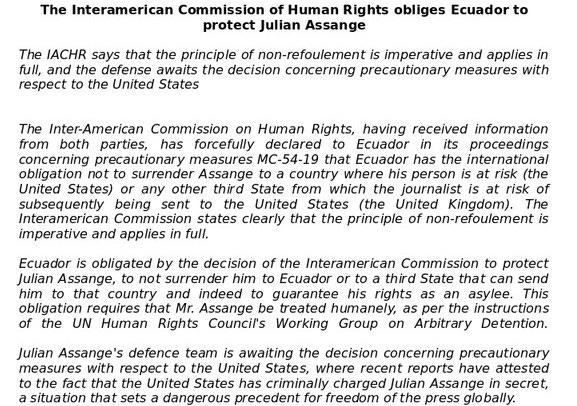
On 14 Mar 2019 The UK Metropolitan Police admitted they had collaborated with US prosecutors in their WikiLeaks investigation for at least the last four years.
On 5 Apr 2019 Ecuador’s Ministry of Foreign Affairs issued a stern denial of the “false news” of an imminent termination of his asylum.
The Ecuadorian Government observes that these falsehoods are also an attempt to sully the dignity of the country. Ecuador adopts its international decisions in the exercise of its sovereignty and with total independence from other countries. […]
By issuing information that falsifies the truth, the asylee and his associates once again express ingratitude and disrespect towards Ecuador, instead of showing gratitude to the country that has hosted him for almost seven years, which has incurred significant expenses to pay for his stay in the Embassy, which has endured his rudeness and whom, paradoxically, he has prosecuted for adopting a protocol of coexistence to prevent his acts of bad behavior from being repeated in the future.
Ecuador also complained to the UN Special Rapporteur on the Right to Privacy, alleging Assange (and/or WikiLeaks) were behind the embarrassing INA Papers (which they both denied). The Ecuadorian Ambassador to London, Jaime Marchan, went so far as to accuse Embassy Cat (long gone) of having been trained to spy on him and any documents lying about in the embassy.
[NOTE: Training cats as spies was something the CIA had tried – and failed at – in their mid-1960s ‘Acoustic Kitty’ operation.]
And then, on 11 April 2019, Ecuador welcomed UK police into their embassy, announced to Assange that Ecuador was revoking his asylum, and permitted the UK police to arrest him and carry him bodily out of the Embassy.
Thanks to RT UK’s Barnaby Nerberka, people around the world witnessed this shocking breach of both trust, and international law. [I wept. Perhaps you did too.]

Thus endeth the seven years as a ‘voluntary’ recluse of Julian Assange.
However, on the eve of Julian’s arrest, another betrayal from within the embassy was uncovered. With or without the knowledge of the Moreno administration, the company contracted some years before to provide security for the London embassy had been corrupted into installing spyware (camera and microphones) throughout the apartment, and secretly channeling feed from them to a US party, the most likely of whom was the CIA. [See affidavits from employees of the security company here and here.] Not only was Julian spied on 24/7, but so were his visitors – his friends, visiting journalists, as well as his private (and legally privileged) consultations with his doctors and lawyers. [Affifavit from his solicitor (point 15) here.]
The Spanish court case investigating this spying is still ongoing, but the UK court did its (unsuccessful) best to prevent Assange from even testifying (by video), and the Scottish court removed the passport of journalist Craig Murray to prevent his scheduled in-person testimony.
One further abuse is of note here. As soon as the body snatching of Assange was achieved, Ecuador handed over his possessions (including printed documents and hand written notes, computers and hard drives – many of which contained legally privileged records), to representatives of the US government – the very people who (it had now been officially disclosed) were seeking to prosecute him. Assange’s solicitor Gareth Peirce lodged an affidavit during the extradition hearing to this effect.
You can read more on the post-arrest events on the defend.wikileaks timeline.
The attitude of the legacy press to Assange’s arrest can best be represented by the New York Times ‘hit piece’ of 11 April 2019 – written by two of what John Pilger has referred to as “Vichy journalists”. As international asylum protocols lay in extremis, these noxious scribes continued to peddle their toxic propaganda, at the same time linking their article to information obtained from WikiLeaks published in their own rag:
The spectacle of Julian Assange, bearded and haggard, resisting arrest while London police officers dragged him through the street, punctuated the end of seven confounding years inside the Ecuadorean Embassy, where he lived with his cat in a small corner room as the world’s most famous self-proclaimed political refugee.
Mr. Assange, 47, has long fashioned himself as a crusader for revealing secrets. The internet group he founded, WikiLeaks, published caches of classified American government communications, as well as emails hacked by Russian intelligence clearly intended to damage the presidential candidacy of Hillary Clinton.
The arrest did not end Assange’s gagging, nor his confinement behind brick walls. To this day, he is involuntarily confined, on remand, behind the walls of the supermax prison HMP Belmarsh, where he has now spent 2.5 years, with much of it medicated (mentally imprisoned) and in solitary confinement. There have been long periods – blamed on the coronavirus “pandemic” – where even his close family: his father, fiancée and small children, have not been permitted to visit him, and his lawyers could not consult with him to plan his defence.
The only occasions on which his voice has been heard in all that time have been his few desperate attempts to correct false statements made in court, and an outburst in defence of a torture victim who the court tried – clumsily – to silence.
From Craig Murray’s fearsomely detailed reports of the “Show Trial” that was the extradition hearing for Julian Assange in the District Court (2020):
Judge Baraitser said she was not going to determine if the US had pressurised Germany or if el-Masri had been tortured. Those were not the questions before her. Mark Summers QC said that it went to the question of whether Wikileaks had performed a necessary act to prevent criminality by the US Government and enable justice. Lewis responded that it was unacceptable to the US government that allegations of torture should be made.
At this point, Julian Assange became very agitated. He stood up and declared very loudly: “I will not permit the testimony of a torture victim to be censored by this court”
A great commotion broke out. Baraitser threatened to have Julian removed and have the hearing held in his absence. There was a break following which it was announced that el-Masri would not appear, but that the gist of his evidence would be read out, excluding detail of US torture or of US pressure on the government of Germany. Mark Summers QC started to read the evidence.
[You can read the affidavit of Khaled El-Masri that so offended the US prosecution and the UK court here.]
The rest of Craig Murray’s records of the hearing are one of the greatest feats of twenty-first century journalism, and should be read in detail by all. They are collected together here. [Craig is himself in a Scottish prison now, on trumped up charges related to his practicing of good journalism.]
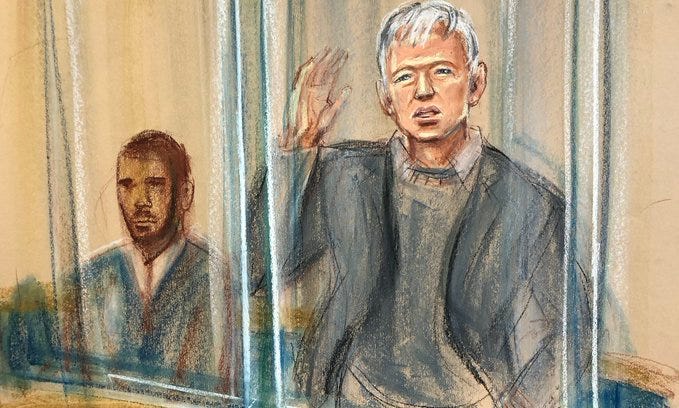
You can also read more on key testimony in the extradition hearings here. All the witness statements that have been released to the public can be viewed here.
Even closer confinement of Julian Assange is sought by the US where, if successfully extradited to their soil, he will be held in solitary confinement under indefinite lockdown while he awaits trial – one of about 80,000 warehoused bodies in those conditions at any point in time within the Great US Prison Gulag that houses more than 2.3 million human beings. UN definitions of torture are ignored there, and the prison system is the one place in the US where slavery is not outlawed by the 13th Amendment.
On 4 January 2021 Judge Vanessa Baraitser handed down her ruling that Julian Assange should not be extradited to the US – on health grounds, related to her assessment that the US prison system would not adequately care for him, specifically in relation to the risk of his suicide. The US appealed this ruling, with the hearing of that appeal heard in the High Court 27 & 28 October 2021. Bail for Julian was refused, so he remains gagged, and locked down, in HMP Belmarsh.
This essay is not directed at Julian Assange’s unjust and probably unlawful imprisonment in the UK or the US. But the attention of all readers should be directed there. Right action is required.
Central messages
Julian of Norwich
The central message of Julian of Norwich’s surviving writings was of the great love that permeates our world and our very existence (down to “every sparrow”), and the trust we can have that “all will be well”. Part way through chapter 32 of her Revelations of Divine Love she gives her understanding of what G-d was really saying in these words (recast here in modern English):
All shall be well. You shall see yourself that all things shall be well. That which is impossible for you is not impossible for me. I shall keep my word in all things and I shall make all things well.
That Julian was not stating this thesis in the absence of knowledge of pain, disease, loneliness, cruelty, and other problems which beset the world in her (and our) time, was aired both in the celebratory song by Meg Barnhouse (linked above), and in the 2017 poem “Dark Moments” by Ann Lewin (complete poem here).
‘All shall be well’…
She must have said that
Sometimes through gritted teeth.
Surely she knew the moments
When fear gnaws at trust,
The future loses shape,
Gethsemane?
Lewin goes on to add that “The courage that says ‘All shall be well’ doesn’t mean feeling no fear, but facing it, trusting God won’t let go.” This is very close to the statement made about fear and courage that would be made by Julian’s namesake 700 years later.
Julian of Norwich points out how much we can learn from our own experience of difficult circumstances, such that even evil deeds can have beneficent outcomes; such that “sin” can have a place in a just and loving world.
This is the contradiction built-in to the human condition – that in order to develop our own loving hearts (what we might these days call empathy) we need to be able to distinguish that which comes from love from that which is bereft of love (what we might now call psychopathy).
The question for us now is what Julian of Norwich meant us to do in the face of the sorrow, pain, hunger, shame, loneliness, disease, cruelty, serious injustice, corruption, torture, and even war crimes we see all around us. Are we to sit idly by, trusting simply that someone else — G-d — will ensure that “all things shall be well’’?
My own view is that Julian of Norwich focused on the heart of the matter: that before all else we need to first situate ourselves in true knowledge of goodness and love. From this love emanates all action which can heal the world so that “all will be well”. Presumably, then, right action on our own part can follow.
However, she also sees that sometimes more is called for than we can do ourselves: “That which is impossible for you is not impossible for me.”
Such “divine intervention” need not take an overtly supernatural form. We are all aware of phenomena which might be classed as serendipity, which takes many forms:
- The variously coloured “swan” events – not foreseen due to our own cognitive blindness
- The “hundredth monkey” phenomena, a story which suggests that a single individual in a group often effectuates changes, as the others copy the behaviour. (Ken Keyes used this as a parable in his similarly named book looking at the risk of nuclear disaster)
- Malcolm Gladwell’s “tipping point”: “that magic moment when an idea, trend, or social behavior crosses a threshold, tips, and spreads like wildfire”, and
- Thomas Kuhn’s concept of paradigm shift.
Julian of Norwich focused on preparing the ground – our own loving hearts – for right action, not on the action that could or should follow.
Julian Assange
Julian Assange, in an early piece of writing (Feb 2007), agreed with Julian of Norwich that love is the right ground for right (or good) action:
When my eyes see phrases like ‘right thing to do’, ‘appropriate’ etc, I wonder what unstated world view I am meant to share. These phases smell of that unusually putrid whip; social sanction. But every man has experienced social sanction as the direct manifestation of morons baying at the moon, nodding and calling the result consensus. […]
Insofar as we can affect the world, let it be to utterly eliminate guilt and fear as a motivator of man and replace it cell for cell with love for one another and the passion of creation.
Most of his life though has been given over to a focus on the action(s) that might help bring about justice. In the same time period (Jan 2007) he wrote:
Every time we witness an injustice and do not act, we train our character to be passive in its presence and thereby eventually lose all ability to defend ourselves and those we love. In a modern economy it is impossible to seal oneself off from injustice.
If we have brains or courage, then we are blessed and called on not to frit these qualities away, standing agape at the ideas of others, winning pissing contests, improving the efficiencies of the neocorporate state, or immersing ourselves in obscuranta, but rather to prove the vigor of our talents against the strongest opponents of love we can find.
If we can only live once, then let it be a daring adventure that draws on all our powers. Let it be with similar types whose hearts and heads we may be proud of. Let our grandchildren delight to find the start of our stories in their ears but the endings all around in their wandering eyes.
The whole universe or the structure that perceives it is a worthy opponent, but try as I may I can not escape the sound of suffering. Perhaps as an old man I will take great comfort in pottering around in a lab and gently talking to students in the summer evening and will accept suffering with insouciance. But not now; men in their prime, if they have convictions, are tasked to act on them.
[NOTE: Julian is alluding above (in para 3) to Part V of Little Gidding (And the end of all our exploring / Will be to arrive where we started /And know the place for the first time), which in turn quotes Julian of Norwich’s “And all shall be well and / All manner of thing shall be well”. Perhaps a little serendipity has been at work here, as well.]
Some years later, after his initial arrest and while out on bail (with a monitor strapped around his ankle), he gave an interview from his temporary home in the Norfolk countryside to TripTV from Brasil. [The crew brought with them a specially made futbol shirt for Assange – which delighted him.]
In this interview (20 May 2011), he describe the action he had settled on as central to his own life, now incorporated in the WikiLeaks philosophy:
WikiLeaks has promoted a certain philosophy in the world, and I will try and distill that philosophy very simply. It is rather abstract, so it can be a bit hard for people to understand.
It is simply that the truth about the world is the only useful ingredient in human decision-making, and human decision-making – insofar as it affects the world in a useful way – must be based on the truth.
Therefore, getting as much true information into the world, and keeping it there, is the only useful way to get good human decisions, and therefore good actions by doing this.
VIDEO: “Julian Assange, do Wikileaks – Entrevista exclusiva para a Revista Trip” from TripTV (Brasil) SOURCE: [YouTube]
[This video contains the last images we have of Julian Assange outside, in nature. It is the source of the image of this Julian at the beginning of this essay.]
In the same month (10 May 2011) Julian Assange was awarded the Sydney Peace Foundation’s Gold Medal (in London) “rewarding exceptional courage” in “championing democracy and transparency” – presented to him by renowned Australian journalist Mary Kostakidis.
[That foundation has now scrubbed the evidence of that award from the normally visible structure of its website, although it can be found using the search facility.]
In his acceptance speech for the Gold Medal, Julian spoke about the courage of whistleblowers:
There is a wonderful scene in ’The Russia House’, a movie based on John le Carre’s novel, where a whistle-blower pleads with a potential publisher — “promise me that if I ever find the courage to think like a hero, then you will act like a merely decent human being.” And that has always been our promise to whistle-blowers and sources: that if you have the courage to act like a hero, then we will act like merely decent human beings as publishers.
And that is why we have never unpublished anything that we have published, no matter what kind of threats have been leveled against us: we have never yielded to attacks on history that our sources have helped us make. That is your common intellectual record and it must remain sacrosanct. We keep the faith with our sources, whose anonymity and courage always humble us.
We are objective but we are not neutral. We are on the side of justice. Objectivity is not the same as neutrality. We are objective about the facts when it comes to reporting and not distorting facts. But we are not neutral about what kind of world we would like to see.
We want to see a more just world.
One could say that, if Julian of Norwich represents the heart of love, omnipresent and enduring in the world, then Julian Assange and WikiLeaks represent the bloodstream, carrying the oxygen of true information to all parts of the body politic.
One could say that, if Julian of Norwich represents the heart of love, omnipresent and enduring in the world,
then Julian Assange and WikiLeaks represent the bloodstream, carrying the oxygen of true information to all parts of the body politic.
They do not do this alone of course, for that is the role of the whole of the fourth estate. But when the circulatory action of the ‘mainstream’ press faltered (and now, with inordinate external and self-censorship, has virtually failed) Julian found a way to enhance this breath of life within democracy: a simple healing mechanism (safe and anonymous leaking leading to worldwide publication), rather than the technocratic remedy (screeds of rules) prescribed by many regulatory bodies and self-appointed “free press” advocates.
There are parallels here with our current public health situation, but I am sure you don’t need me to point them out.
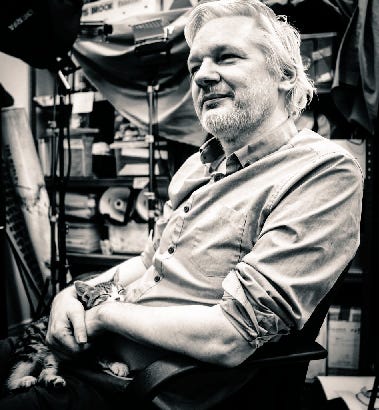
How will they be remembered?
Julian of Norwich
Pope Benedict XVI said of Julian and her revelations (1 Dec 2010):
The theme of divine love recurs frequently in the visions of Julian of Norwich who, with a certain daring, did not hesitate to compare them also to motherly love. This is one of the most characteristic messages of her mystical theology.
The tenderness, concern and gentleness of God’s kindness to us are so great that they remind us, pilgrims on earth, of a mother’s love for her children. In fact the biblical prophets also sometimes used this language that calls to mind the tenderness, intensity and totality of God’s love, which is manifested in creation and in the whole history of salvation that is crowned by the Incarnation of the Son. […]
Julian of Norwich understood the central message for spiritual life: God is love and it is only if one opens oneself to this love, totally and with total trust, and lets it become one’s sole guide in life, that all things are transfigured, true peace and true joy found and one is able to radiate it.
I would like to emphasize another point. The Catechism of the Catholic Church cites the words of Julian of Norwich when it explains the viewpoint of the Catholic faith on an argument that never ceases to be a provocation to all believers (cf. nn. 304-313, 314).
If God is supremely good and wise, why do evil and the suffering of innocents exist? And the Saints themselves asked this very question. Illumined by faith, they give an answer that opens our hearts to trust and hope: in the mysterious designs of Providence, God can draw a greater good even from evil, as Julian of Norwich wrote: “Here I was taught by the grace of God that I should steadfastly hold me in the Faith … and that … I should take my stand on and earnestly believe in … that ‘all manner of thing shall be well’.
– (The Revelations of Divine Love, Chapter 32).
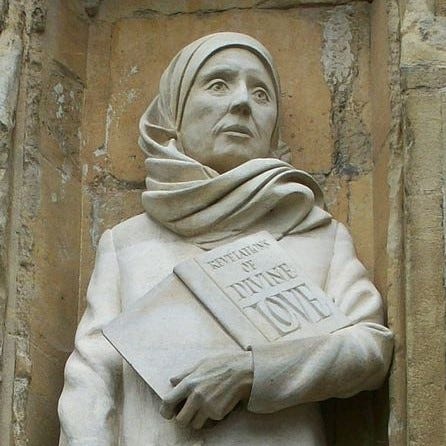
As previously noted: A whole network of women and men, both enclosed religious and lay admirers of her writing, has surrounded and celebrated Julian’s words from her own time to ours – a veritable Team Julian spread across countries from Britain to (eventually) Australia, spreading across the “between time” and continuing into the future. They have been drawn to the optimism of her message (written in a time of recurring plague, religious and political upheaval, and omnipresent danger to dissident thinkers.) More, they have been drawn to (and energised by) her message of love – omnipresent, enduring, and nourishing – at the heart of all life.
In a letter to Sr M Madeleva, the Trappist monk Thomas Merton (1915-1968) said of Julian of Norwich:
Julian is without doubt one of the most wonderful of all Christian voices. She gets greater and greater in my eyes as I grow older. In the old days I used to be crazy about St John of the Cross, but I would not exchange him for Julian if you gave me the world, and the Indies, and all the Spanish mystics rolled up in one bundle. I think that Julian of Norwich is with Newman, the greatest English theologian”.
Julian Assange
In 2019, Nick Pemberton wrote:
No hero is a hero of their time—but history, if it exists after climate change, will reward Mr Assange and Ms Manning for their efforts. In this life, even in, no especially in, the capital of the free world, free speech is a crime worthy of torture.
The world has had many martyrs before, people who are lauded after – preferably long after – their deaths, once their uncomfortable characteristics have been eroded by time. Is this the fate of Julian Assange?
Julian’s life is really in danger. I see him every week, and every week he is weaker. The incredible burden of the forces against him bear down on his body and his mind.
The risk to Julian is not suicide. It’s that they are killing him.
– Stella Moris, in France (16 Nov 2021)
After his death (in prison – probably diagnosed as from coronavirus) will we have a “Julian Assange Day” celebrated by tweets from the CIA & FBI (as they both had the gall to do for Martin Luther King Jnr Day after being implicated in his murder)?
Or a saccharine docudrama from Netflix? The Assange-Moris Love Story from Disneyworld perhaps?
Or will he be remembered, in deep history, as Patti Smith said he should be remembered – that “Wikileaks was formed as an act of love”, and as other friends and supporters, worldwide, have already eulogised him – in life?
Craig Murray — Scottish journalist (currently in jail for his journalism):
There should be no doubt that Julian Assange is … the greatest editor and publisher of our time. He is a man whose impact on society has been transformational. He has been at the centre of profound social change, whereby the public are no longer passive consumers of whatever version of the news the corporate and state media choose to feed them.
Rather, the public increasingly seek, proactively, to go to the source and find what is the actual truth about what is happening in this world, and the truth is very, very different from the lies and the spin put out by the corporate media.”
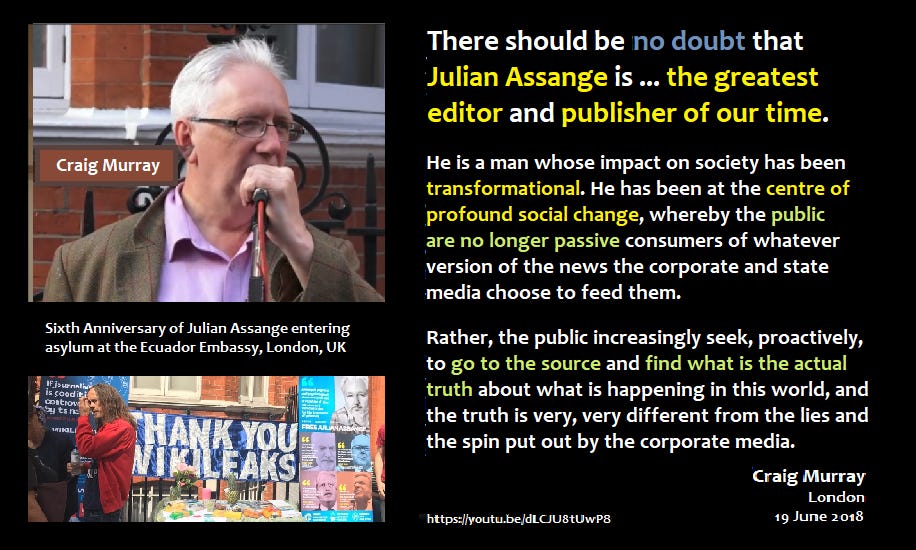
Alicia Castro, already quoted above, further stated that, on first meeting Assange:
I expressed to [Julian] how much we, the Latin Americans, had to thank for his revelations about the diplomatic cables that showed the deep and perverse degree of interference by the United States government in our affairs. I myself had as proof the cable that the ambassador of the United States in Argentina, Lino Gutierrez, wrote about my appointment as ambassador in Venezuela, where specific details of my actions are described, which I did not even remember.
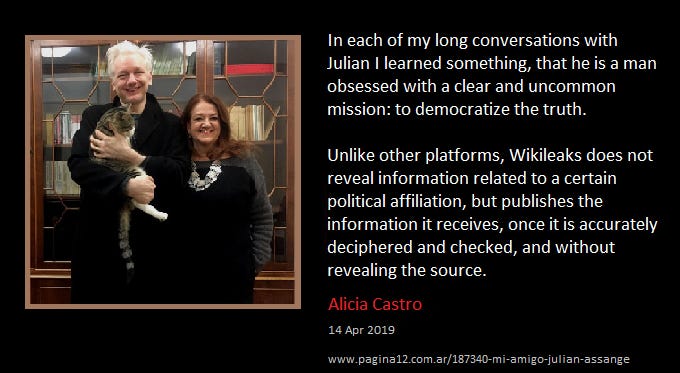
Angela Richter, already quoted above, also stated (3 Jan 2019) that
It is difficult to describe the complex character of Assange. […] He is a meticulous archivist, a courageous revelator and uncompromising iconoclast, highly emotional and at the same time factual, alongside whom most of the artists and intellectuals I know seem like petty bourgeois who sell their personal neuroses profitably.
But if Assange is not the nefarious unsympath who is to blame for his own situation through his egomania, what does that mean in reverse? Isn’t he then a blueprint for all of us?
What has happened to him for years in the middle of Europe shows what could happen to anyone who dares to raise their voice and reveal the truth about the powerful. Not in Russia or China, but in the free West.
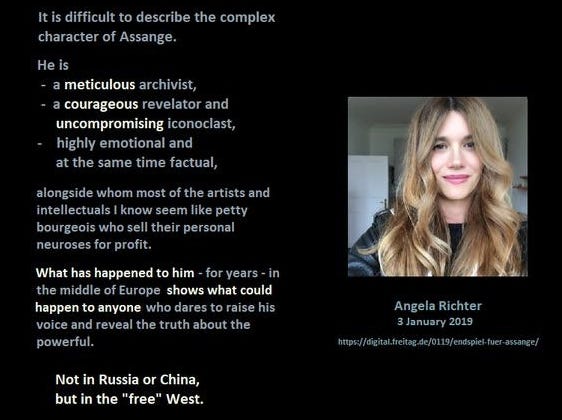
Roger Waters: Musician
Julian Assange is a national Australian treasure. He is a brilliant, brave, honest, humane, relevant, genuine journalist and publisher of immense influence and significance on the word stage.
He has shown himself to be an enormous power for good in a world that is sadly, with some notable exceptions, (Yes John Pilger, I mean you among others,) starved of his ilk.
What Julian Assange is, as a publisher of real news, is a real hero.
What he is not is a criminal.
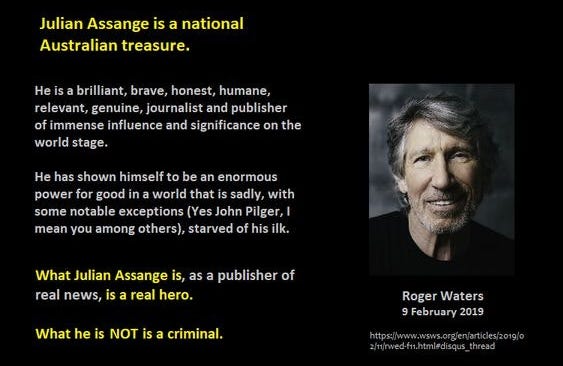
George Galloway: UK politician, writer, broadcaster
Julian Assange should be a Nobel Laureate. He should be a hero of every journalist, every liberal, every progressive, anywhere in the world.
The fact that he’s not shows the enemy never sleeps, and they’re ready to smear, slander, and trap anyone who is dangerous to them.
And Julian is certainly a clear and present danger to liars, the warmongers, and the criminals who rule us.
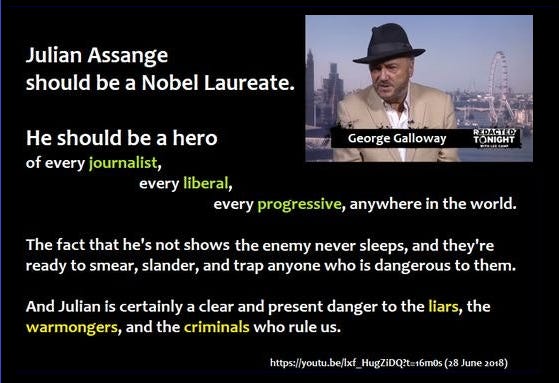
John Pilger: Journalist and film maker
I know Julian well. I regard him as a close friend. a person of extraordinary resilience and courage. I’ve watched the tsunami of lies and smear engulf him endlessly, vindictively, perfidiously. And I know why they smear him.
In 2008, a plan to destroy both WikiLeaks and Julian was laid out in a secret document (dated 8 March 2008). The authors were the cyber counterintelligence assessment branch of the US Defense Department. They described in detail how important it was to destroy (and I quote) “the feeling of trust that is WikiLeaks’ centre of gravity”. […]
It was as if they planned a war on a single human being. and on the very principle of freedom of speech. Their weapon would be personal smear and their assassins would be journalists – the very people who are meant to keep the record straight. and tell us the truth
The irony is that no one has told these journalists what to do. I call them Vichy journalists, after the treacherous Vichy government that served the German occupation of wartime France. I’ve been a journalist for many years, and I’ve never known such corruption of my craft. It is as if a world of illusions has consumed the last vestiges of honest media in the cause of decaying power – its wars and witch hunts.
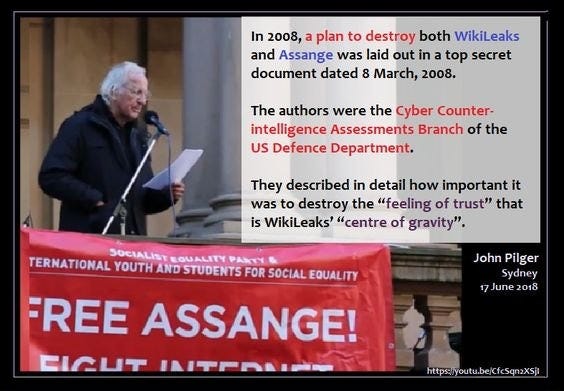
Tulsi Gabbard: US politician
If the government can change the designation of @Wikileaks from being a news organisation (Obama’s designation of Wikileaks) to a hostile intelligence agency (Trump Admin’s designation) then any entity – online and offline – is in danger of being designated a ‘hostile intelligence service’ if they carry out investigative reporting that the US government or a particular administration considers to be hostile to itself.
This will have a chilling effect on investigative reporting of powerful government agencies or officials, including the president, intel agencies, etc.
This is a serious breach of our constitutional freedoms and every American – Democrat, Republican or Independent – must stand up against it.
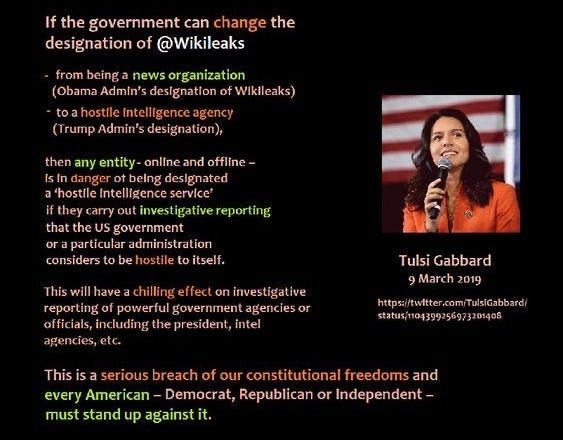
Laurie Love: UK ‘‘hacktivist’ and US extradition hearing survivor
We have seen, throughout the period in which Julian has been detained, that the world has become a far less stable place because of unchecked power. The only way to improve that situation is to continue to fight for truth-tellers.
There is no better example, in my opinion, of a truth-teller in our current era than Julian Assange.
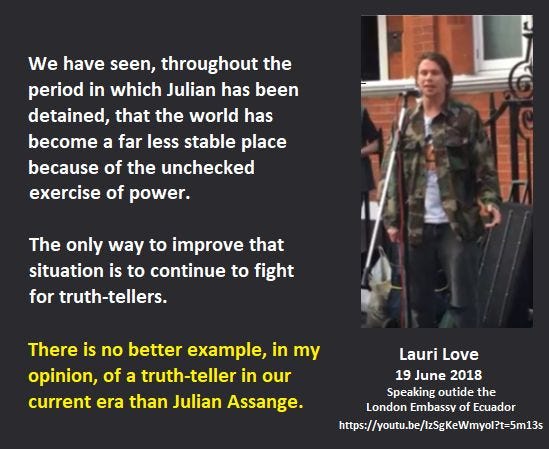
Ögmundur Jónasson: Icelandic politician
The role played by whistleblowers could be seen as a public service. We owe a lot to Chelsea Manning, Edward Snowden, & Assange.
I don’t know Julian Assange personally, although I met him when he came to Iceland. But I look at what he stands for and that is where I side with him; his endeavours to open the secret world of the military and power politics.
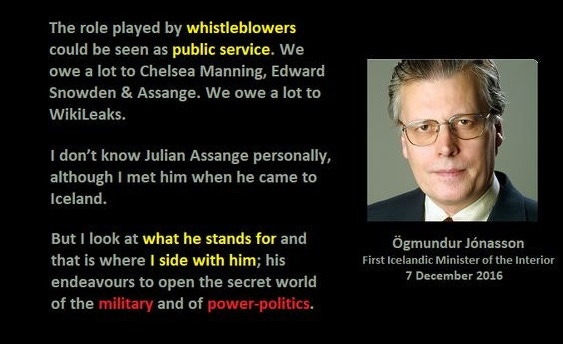
Beppe Giulietti: President of the Italian Union of Journalists
I find it singular that Assange has been a “recluse” for seven years, as opposed to those who falsified dossiers and provoked wars.
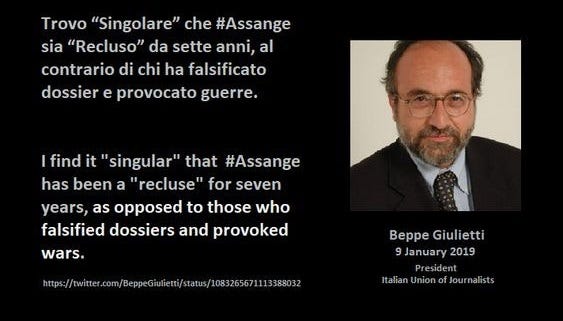
Nozomi Hayase: US psychologist, writer
This cruel persecution of Assange represents a deep crisis of Western democracy. As injustice against this Western journalist prevails, the legitimacy of traditional institutions has weakened.
The benevolent democracy that many were taught to believe in has been shown to be an illusion.
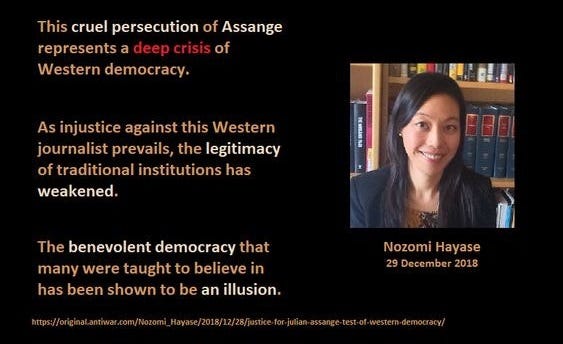
Slavoj Žižek: Slovenian philosopher
Not only have we learned a lot about the illegal activities of the US and other great powers. Not only have the WikiLeaks revelations put secret services on the defensive and set in motion legislative acts to better control them.
WikiLeaks has achieved much more: millions of ordinary people have become aware of the society in which they live.WikiLeaks does make us worry. And unfortunately many people don’t like that.
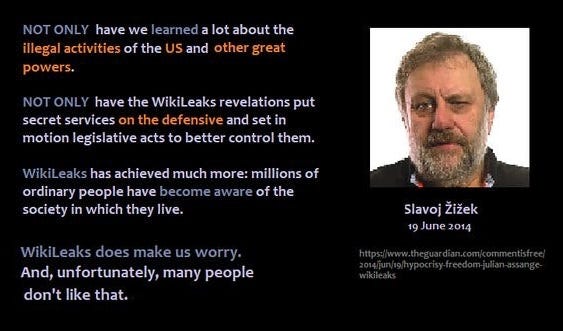
Evo Morales: President of Bolivia (and survivor of a US-backed coup)
Julian Assange, founder of WikiLeaks, was arrested by the British police for revealing secret reports proving interference by the empire all over the world, and he has been a victim of persecution by those in power for years in the embassy of Ecuador in London.
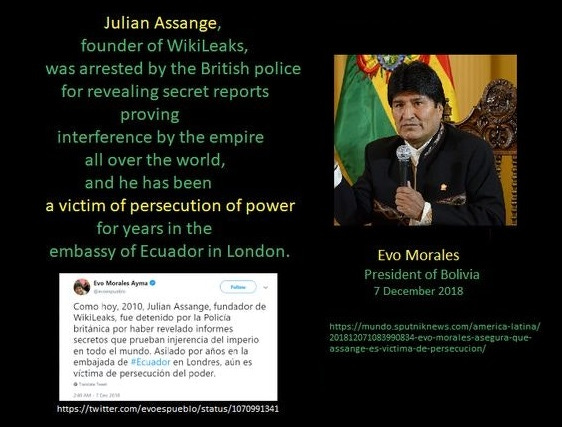
Caitlin Johnstone: Australian Writer
Relentless smear campaigns against Assange have given the empire the ability to publicly make an example of a journalist who published inconvenient facts without provoking the wrath of the masses. It’s a town square flogging that the crowd has been manipulated into cheering for.
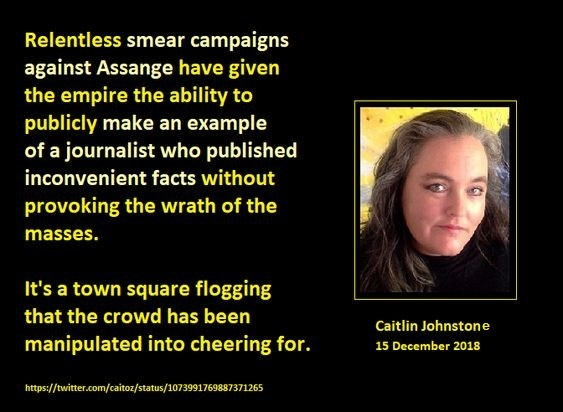
Ken Loach: UK Film and TV director
The continuing persecution of Julian Assange is an affront to our sense of justice. Our legal system is being manipulated to keep a brave man in isolation.
Julian and those who have contributed to Wikileaks, and others like Edward Snowden, have risked everything to reveal the dirty secrets our governments want to keep from us. Our democracy depends on our knowing what is done in our name. […]
Shame on those journalists who benefit from Wikileaks but now find excuses not to stand by him. In the end they will be shown to be cowards and hypocrites.
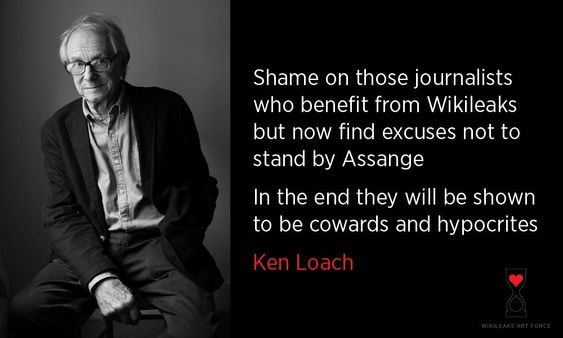
Cynthia McKinney: US ex-Congresswoman
The greatest purveyors of violence on the planet being the US government, then of course it is incumbent upon us to know what the heck our government is doing in our name, with our tax dollars.
This is a service that WikiLeaks provides to all of us: that we can point to official US documents and say ‘this is the impact of what the US did at a particular point in time’.
If we don’t have good information we cannot have good governance.
If we don’t have good governance we aren’t going to have good government.
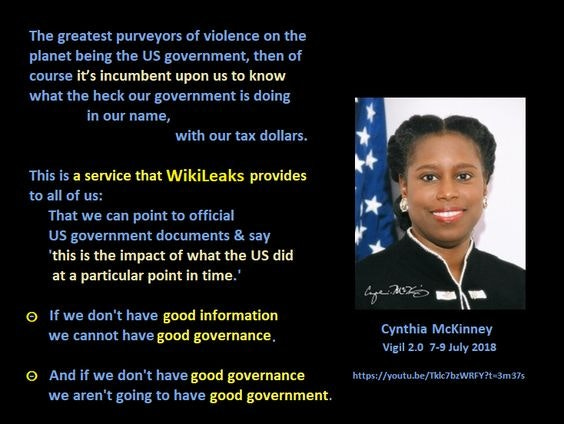
Daniel Ellsberg: US Whistleblower
Ellsberg is referring here to Assange’s famous statement:
“Transparency is for governments. Privacy is for individuals.” [YouTube]
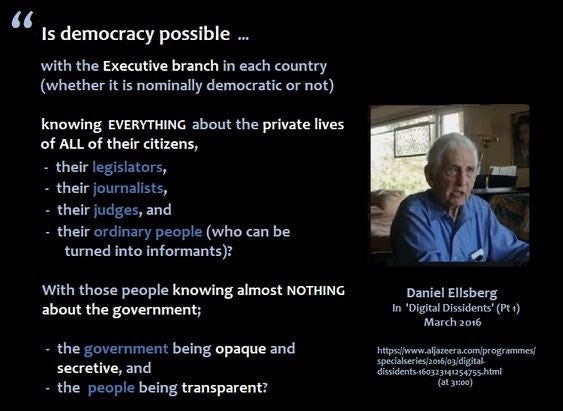
Yoko Ono-Lennon: Musician
The 2013 Courage Award for the Arts is presented to Julian Assange.
With your courage the truth was revealed to us – thank you – and gave us wisdom and power to heal the world.On behalf of the suffering world, I thank you.
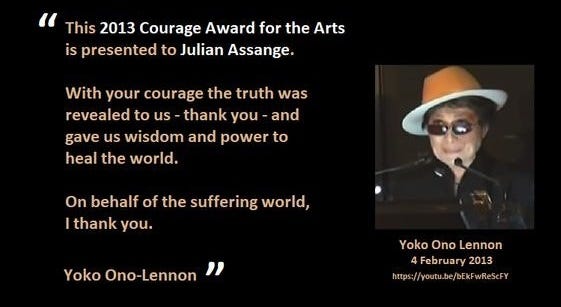
Amy Goodman – US Journalist
Information is power. Information is a matter of life and death.
We’ve learned that through these remarkable trove of documents that have been released in the last year. The Iraq War Logs, the Afghanistan War Logs, and what’s been called Cablegate, the U.S. state department documents that are continuing to be released.
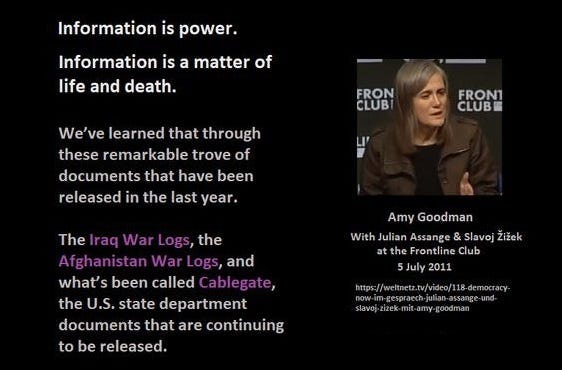
Ann Ranberg: [Then] Secretary General of the Swedish Bar Association
I fear that the treatment of Assange has damaged the reputation of the Swedish judicial system […]
Let us not forget that whatever we may think of Assange or the deeds he was suspected of, this is about much more. It is about freedom of speech and the rule of law principles. It is ultimately about the right and the moral obligation to expose war crimes.
Assange and Wikileaks did it. The revelations about US abuse were necessary and particularly important.Should we extradite to Germany’s Hitler someone who has revealed the existence of concentration camps and genocide, regardless to how that information was obtained?
I don’t think so.
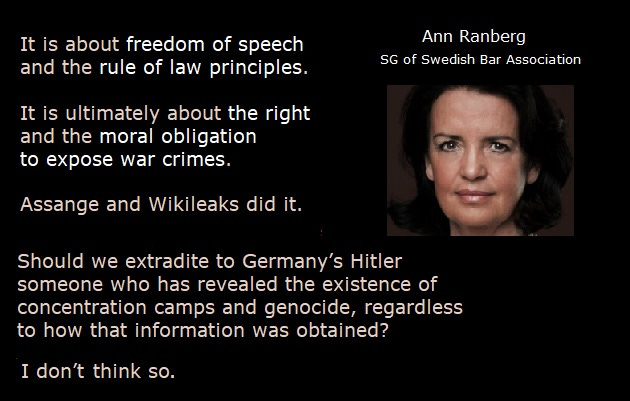
James Cogan: Australian journalist
There is an enormous disconnect between official policy [in Australia] and the way masses of people think and feel about Assange and WikiLeaks. There is immense public support, but it finds no expression either in the parliament or in the mass media.
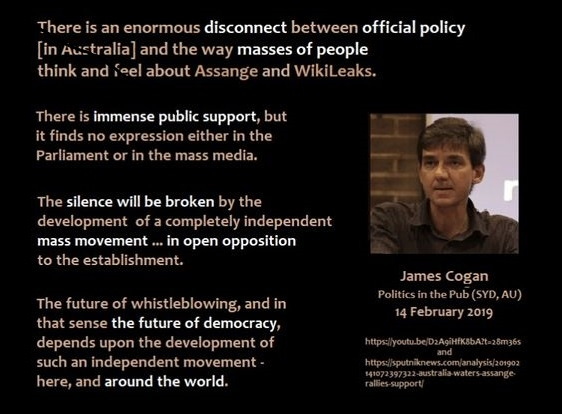
Supporters around the globe:
On the occasion of Julian’s 48th birthday (3 July 2019) – lovingly collated by Alex Hills.
VIDEO: “Candles4Assange Birthday Vigil SINGALONG (2019) 62 cities in 6 continents” [YouTube]
In closing
My apologies to the many thousands of others who have made worthy statements on behalf of Julian Assange. There are only so many I could fit in here.
My hope and prayer is that what can be put on the memorial stone for Julian Assange, when the time comes, is that he died a free man, from old age, holding the hand of his loving wife of many years, surrounded by his children and grandchildren, and that he is remembered and revered across the world for his work for transparency and justice.
All will be well, and all will be well, and all manner of things will be well.
The author of this essay lives in Buenos Aires, Argentina.
While not a Catholic (or a Christian) I have found the words of Julian of Norfolk inspirational (and, like many, comforting) in these dark times. I hope they bring comfort to readers as well. I have also (as noted above) long been a supporter of Julian Assange. While factual statements stand on their (linked) sources, personal opinions expressed in this essay are mine alone, and should not be taken as representing the views of anyone else connected to the Free Assange movement.
My previous paper “The Strange Case of Coronavirus in Argentina” is here.
A related, but older, more personal account “First encounter : A coronavirus tale” (on a different platform) is here.
Also on Twitter at La Fleur Productions.
Thanks for reading this essay.
This is my permission to republish it, preferably the whole story or an introductory section, unedited, and providing a link back to this article. Contact the author if you wish to discuss its contents, or if you find a factual error.
All images are included either under “fair use” terms for the purpose of education, discussion and commentary, or belong to the author, or have appropriate creative commons licences.
APPENDIX
Some resources re Julian of Norwich
- Anglican Focus (Australia) “Julian of Norwich: ‘all shall be well’” [Website]
- Bonnie’s Books “Caturday ~ Julian of Norwich” [Website]
- Paul Harris, of The World Community for Christian Mediation [Website]
- Saieditor (Australia) “Dame Julian of Norwich” [Website]
- Georgia Rona Crampton (University of Rochester) “The Shewings of Julian of Norwich: Introduction” [Website] Associated text of Revelations with numbered lines [Website]
- Winthrop University “Resources on Anchoresses and the Anchoritic Life” [Website]
- Umilta [Website]VIDEOS
- Britt Robison “Julian of Norwich” [YouTube]
Includes images inside the church and the replica cell - Revd Dr Stephen Wright “What can we learn from Julian of Norwich” [YouTube]
- Robert Fruehwirth “Julian of Norwich: Revelations of Divine Love” [YouTube] A detailed commentaryMANUSCRIPT IMAGES
- Image of blessing on installation of an anchoress: Stanford: Parker Library “Cambridge, Corpus Christi College, MS 079: Pontifical”, p200 [Website]
- Image of “The Short Text”: British Library, MS 37790 (mid C15th) ff.97r – 115r [Website]
You may also like
-
Global Assange Amnesty Network (GAAN) call upon Amnesty International to declare Julian Assange a Prisoner of Conscience retroactively
-
“Assange was saved by the U.S. presidential race” – But, can he feel safe?
-
Nomination of Julian Assange for Nobel Peace Prize 2023
-
Assange Loses, High Court Allows US Appeal; Quashes Assange’s Discharge
-
New FOI responses confirm the British government’s media campaign against Julian Assange
